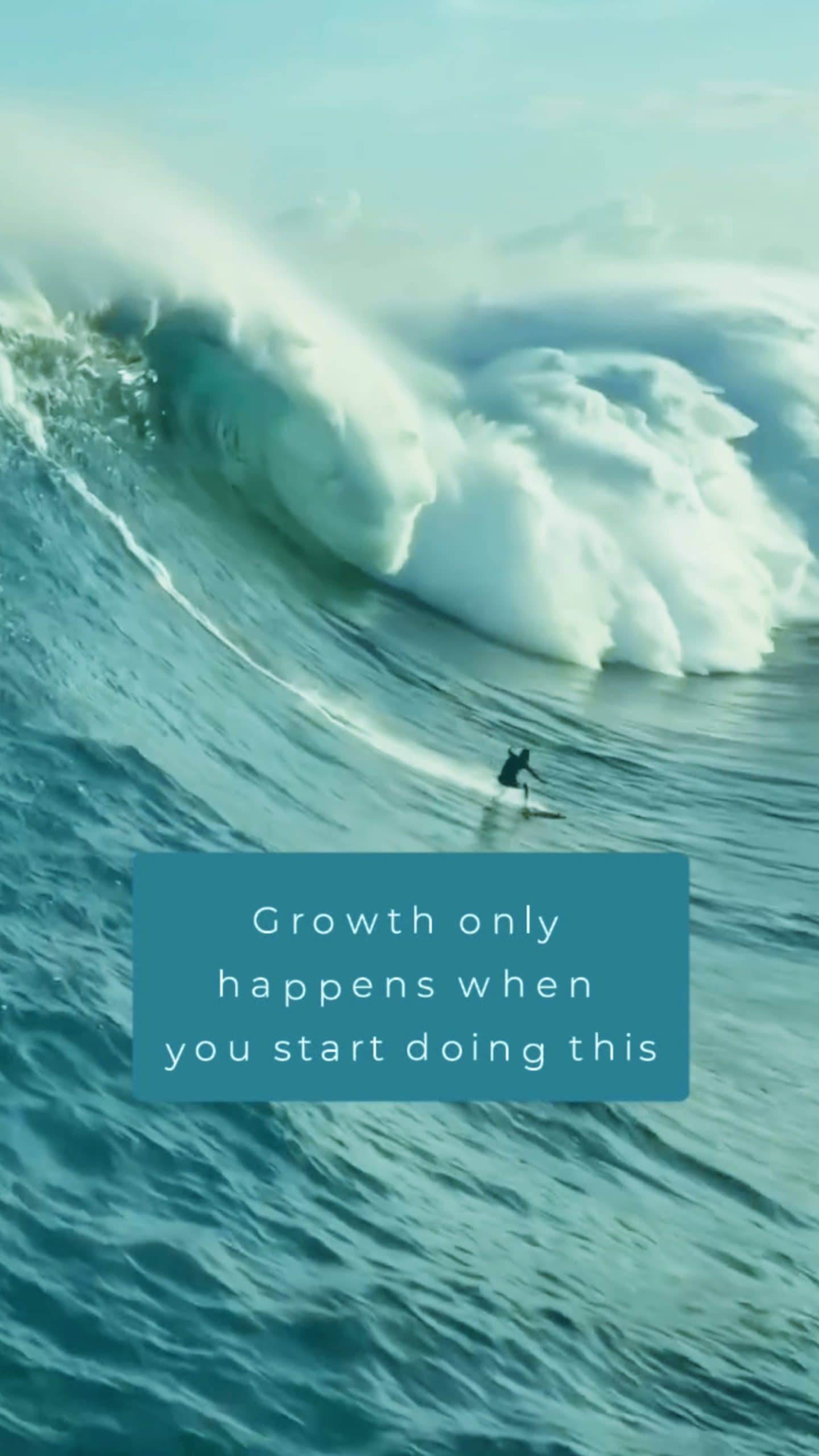
Growth only happens when we start doing this
- Stop running and confront fear.
Fear is a natural response to danger, but it’s often just an illusion – a projection based on past experiences or imagined futures. The more we avoid it, the more we let it control us. The more we run, the more power we give it. - Realize fear doesn’t have as much control over you as you think.
Fear loses its grip when you face it. It’s just a feeling, not a fact. The paradox is we fear fear itself, but when we confront it, we often see it’s not as bad as we thought. - Feel fear – it means you’re at the edge of your comfort zone.
Fear shows where growth is needed. Right before you push through discomfort, that’s often where the most transformation happens.
TAKEAWAY 🥡
The Paradox of Fear:
What we fear most often holds the key to our growth. Facing fear can lead to liberation and self-realization. Fear can guide us to what matters most – but only if we face it. Avoiding it keeps us stuck, missing out on freedom and courage.
Does this resonate with you?
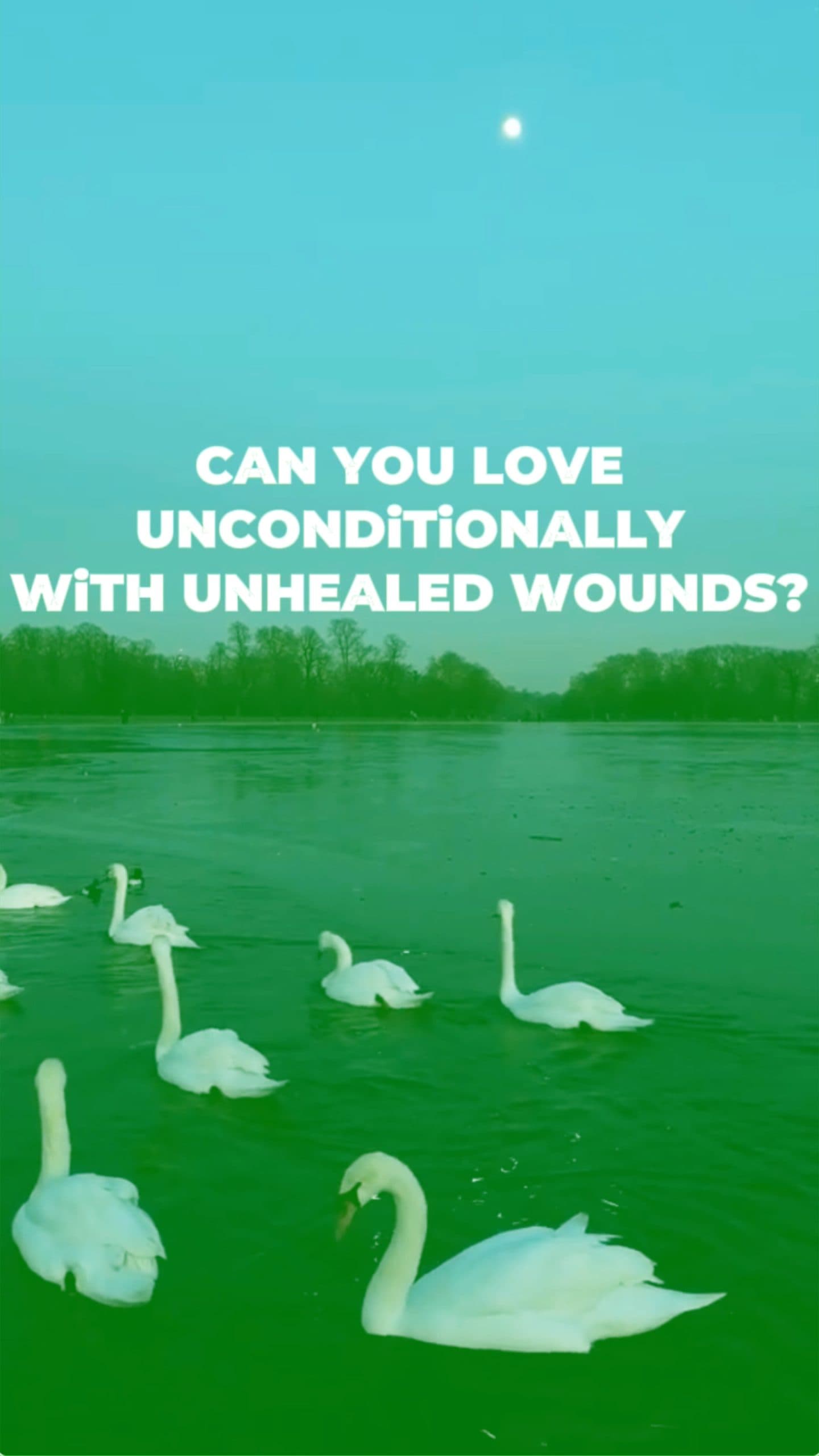
Can We Love Unconditionally With Unhealed Wounds?
Unconditional love is not an instinct. It is the sum of our healing.
Instinct is what we’re born with. It is hard-wired. It is reflexive. It helps us survive.
A baby cries when it’s hungry. A parent protects their child. We avoid pain.
These are instincts.
If unconditional love were instinct, we’d all love without conditions by default. But we don’t.
– We love as long as our needs are met.
– We love as long as we feel safe.
– We love as long as we are treated well.
Conditions are built into the love we experience because we are wounded.
Love with conditions is learned. We were taught:
– Approval must be earned.
– Love can be withheld.
– We must be a certain way to be accepted.
Healing crumbles the walls we built to protect ourselves.
Healing means facing wounds, identifying unconscious patterns, and reclaiming the love buried under our pain and protective shell.
The more we heal:
– The less we protect ourselves with conditions.
– The less love feels like a transaction.
– The more love becomes a state of being.
We are born with unconditional love, but our conditioning often causes us to forget it. We can return to it – by healing or becoming aware of everything that taught us otherwise.
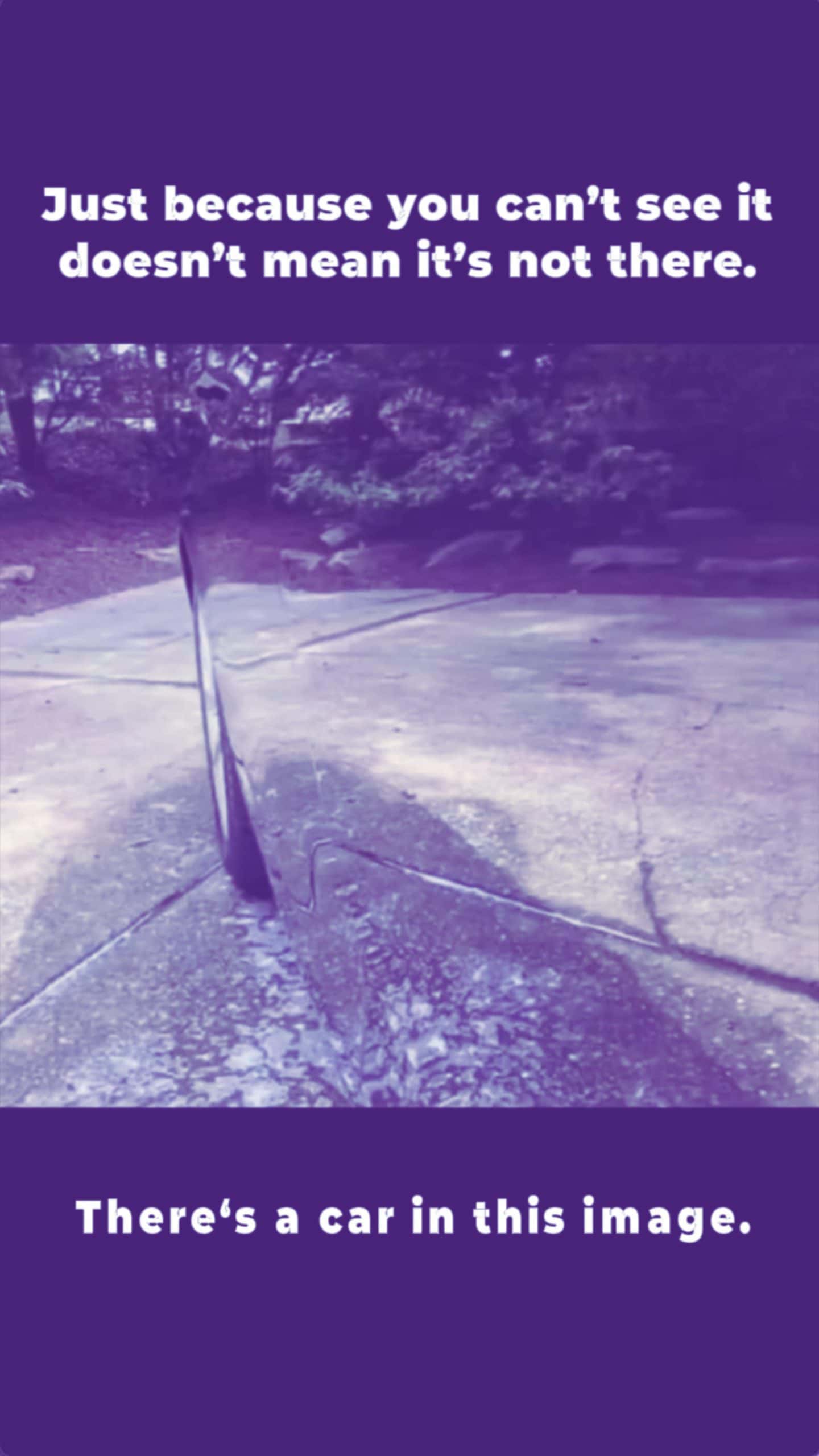
Just because you can’t see it, doesn’t mean it’s not there.
Could you make out the car?
Because we can’t measure things like mental, emotional, or spiritual capacity, we often assume our perception of reality is the complete truth. But in reality, what we perceive is relative to the limits of our own capacity – whether mental, emotional, or otherwise – and doesn’t encompass the full scope of what’s actually happening or possible. Our perception is just a reflection of what we can currently grasp, not the entirety of reality.
Think about how the human eye can’t perceive infrared or ultraviolet light, but those spectrums are still real and measurable. Our awareness works the same way – just because we aren’t tuned into a particular layer of reality doesn’t mean it’s not happening.
Training the mind, emotions, and perception is like exercise. If you don’t use certain muscles, they weaken. If you never push beyond your current limits, you assume those limits are absolute.
But with deliberate effort – whether through introspection, meditation, life experience, or deep engagement with new perspectives – you expand what you’re capable of perceiving and understanding.
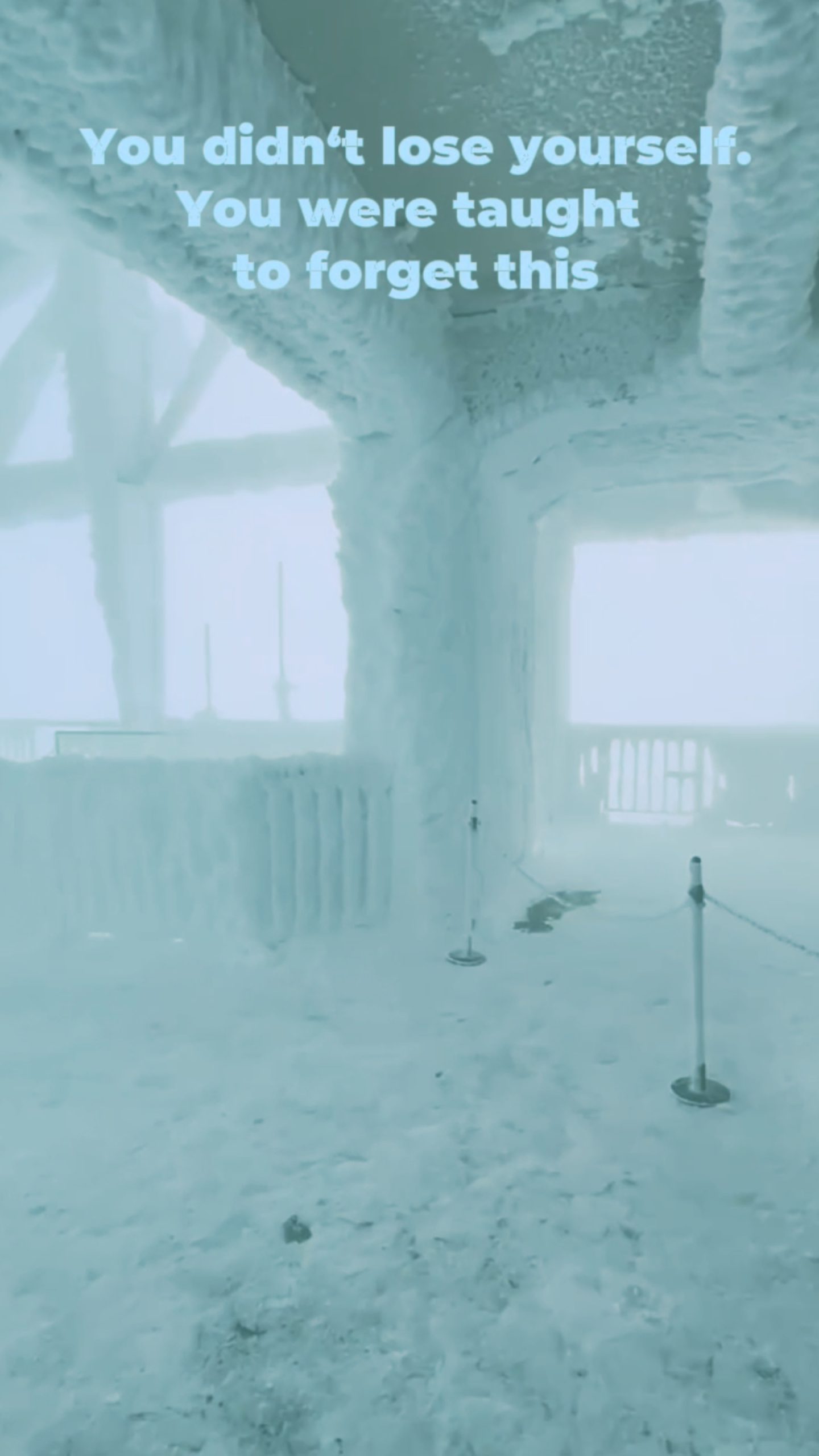
You didn’t lose yourself. You were taught to forget this
- You were born whole – connected to yourself. Free, expressive, alive.
- Then came the rules: Obey. Be good. Don’t be too much.
- Bit by bit, you silenced parts of yourself to fit in.
- The more you adapted, the more you disconnected – from yourself – your feelings, needs, and inner knowing.
- This disconnection is the root cause of the brokenness and/or the void you may feel, the restlessness, the sense that something is missing.
- But the truth is, you were never broken. You were never lost.
- Who you truly are, your essence, is still there – just buried under layers of conditioning.
Become aware of the disconnection and unlearn what was never true to your essence.

Fame will give you everything but this
Taylor Swift being escorted by her bodyguard into the restroom at the Super Bowl shows this: She’s not free to move, even to the bathroom.
She needs security because of the attention she gets, the potential danger that comes with it. Her bodyguard isn’t just protecting her; they’re a reminder of how controlled her freedom is.
Fame and wealth come at a price. They look shiny, like they offer everything, but they strip away basic freedoms. You can’t sit in a café, meet new people without wondering if they have an agenda, or even just breathe in nature without someone ready to turn your private moments into public content. The things that make life human – spontaneity, connection, real freedom – all get lost.
The world becomes a stage, and you always have to be in character. People don’t see you as a person anymore. They see you as an image, an object for their adoration, entertainment or something to envy. Every move you make turns into something for others to consume.
The idea of fame is glamorized, but it’s a glittery, public cage. It’s a life lived for everyone else’s eyes. You have to keep performing – whether you want to or not. And you lose the ability to just be.
“Not all prisons have bars.”
It’s the invisible things – social, emotional, cultural pressures – that trap you just as much as walls and gates.
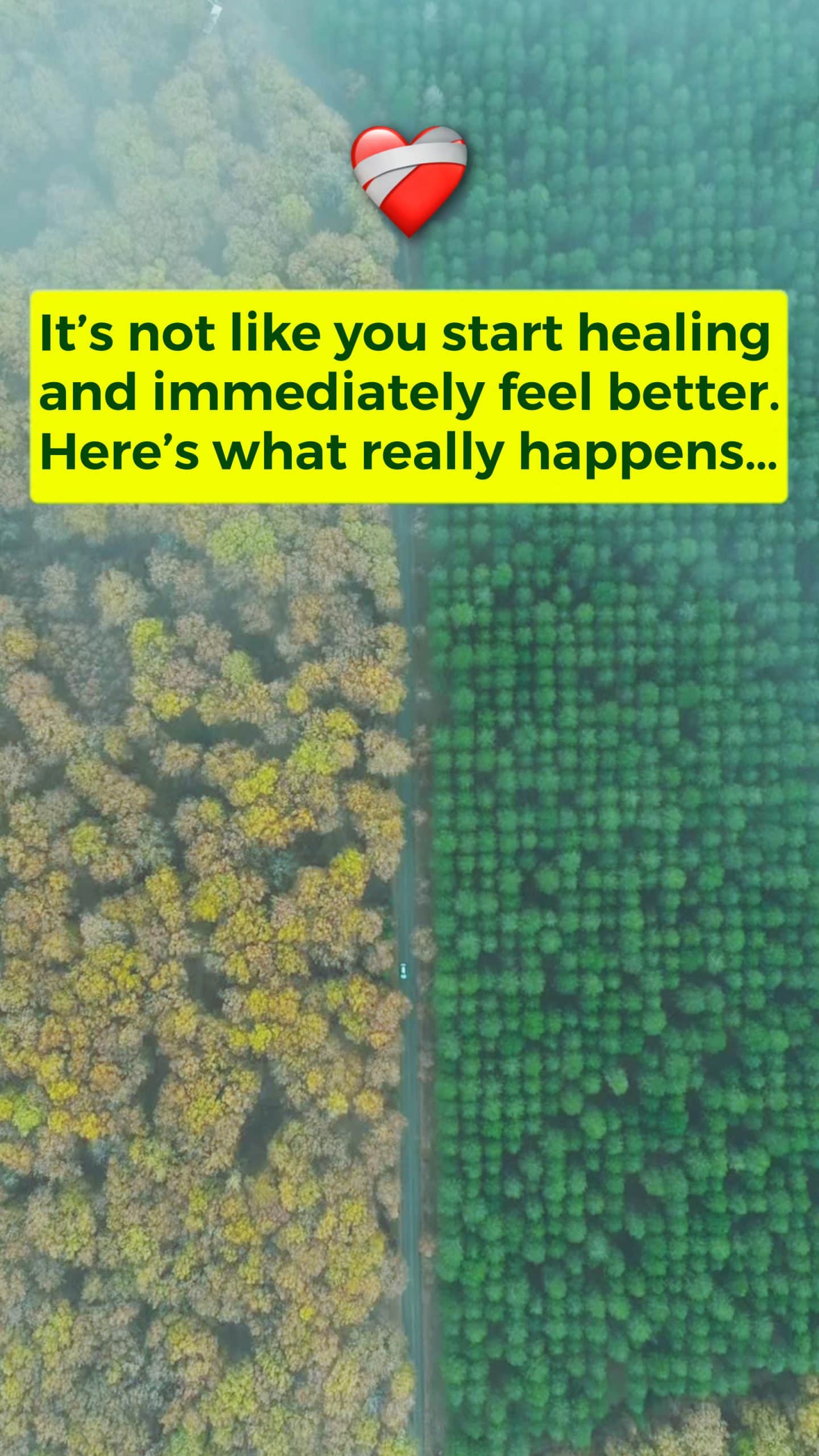
It’s not like you start healing and immediately feel better. Here’s what really happens…
What happens is everything you’ve avoided starts coming up – the pain, the trauma, the stuff you buried. It’s all the emotions, issues and experiences you never dealt with, just sitting there, waiting to be addressed.
It is like cleaning out a basement or attic you’ve been avoiding for years – the dirt, the mess, the ugly stuff you didn’t want to look at. Why didn’t you look at it? Because it made you feel bad, weak or like something was wrong with you. Or it just hurts. So, you procrastinated. But when you start healing, those things you shoved aside come flooding up, and it’s not pretty or neatly packaged. It’s a mess.
That mess? It’s part of the process. It’s not a sign you’re failing. The discomfort is part of healing. It’s necessary. It clears space, so you can move forward.

The secret that Muybridge’s famous horse reveals about your thoughts?
Muybridge’s famous experiment revealed that
- movement (in this case: a galloping horse) is not a unified, unbroken whole, but rather a sequence of distinct, discrete moments. Before this, motion was imagined as undifferentiated, cohesive, with one pose melting into the next. Now, we can see that this blur is actually a succession of defined, individual moments.
Here’s the secret:
- Your thoughts work the same way. You might experience them as one big stream, thoughts flowing into another without interruption. But, like Muybridge’s observation, if you look closely, you’ll see the gaps – where one thought ends and another begins.
When you step back and observe your thoughts,
- you’ll realize they’re not a cohesive, uninterrupted stream. They’re separate moments, like individual frames in a picture, that you put together into a narrative.
This awareness is the beginning of self-realization.

What if self-improvement is just another way to avoid yourself?
1 The push to “be better” often covers up a deeper fear of facing yourself as you are.
2 The idea that you need fixing is based on a belief that you’re broken or not good enough.
3 Self-improvement can become an obsession, just another checklist – an endless chase that keeps you from true self-acceptance.
4 The real work isn’t about changing. It’s about integrating, accepting – fully being.
5 Instead of trying to upgrade yourself like a project, what if you just allowed yourself – light, shade, and everything in between?
What if the real work isn’t improving, but simply being?

People think that acknowledging someone’s emotions means agreeing with them.
They fear that if they validate feelings, they lose their stance, their status, or their authority.
It becomes a rigid, dualistic mindset: Either I win, or you win. Either I stay in control, or I lose it. There’s no room for real inter-action. Just domination or dismissal.
This is why people mock, bash and cancel Selena Gomez for crying about deported immigrants. They see her emotion as a threat to their position. If they acknowledge the pain, they think it means agreeing that deportation is wrong. But that’s not the question here.
You can recognize suffering and still believe in enforcing laws. You can feel for people without changing your stance. But we aren’t taught to hold both at once. Instead, we harden ourselves, thinking that compassion makes us weak and will interfere with making tough decisions.
Parents and adults do this to children all the time. A child cries, and instead of acknowledging the emotion, the parent shuts them down – mocking, gaslighting, dismissing. Not because the child is wrong to feel that way, but because the parent fears losing control. They think validating emotion means giving up authority. They fear that if they soften, they’ll lose power.
It’s ironic, though. America itself was built on lawlessness – conquering and taking Native American land. Yet now, those in power act as if law and order were always absolute.
The truth is, the law has always been flexible, changing to serve whoever is in control. Mocking emotion isn’t about logic or justice – it’s about protecting power and avoiding uncomfortable truths.

We believe that the way we see the world is the way that really is
Imagine going through life in a tunnel.
When I am convinced the walls around me are reality, they become the entirety of what I call reality.
While they are what they are – beliefs, opinions, and concepts – some mine, but most conditioned into me – believing they are reality traps me within them.
Mistaking them for the Truth, I will drive down the tunnel without ever questioning if there’s a way out, unaware that the tunnel exists only because I believe it does.
Now, one day, if I step outside, I come to realize – like Jim Carrey in The Truman Show – it wasn’t reality. After all, it was a tunnel, shaped by my beliefs, fears, and assumptions, built so convincingly that I never thought to question it.
Pointer: The reality I thought I knew was only the one I was tuned to see. It was a reality, yes – but not the Reality. Just a version, shaped by the lens of my conditioning and perception.
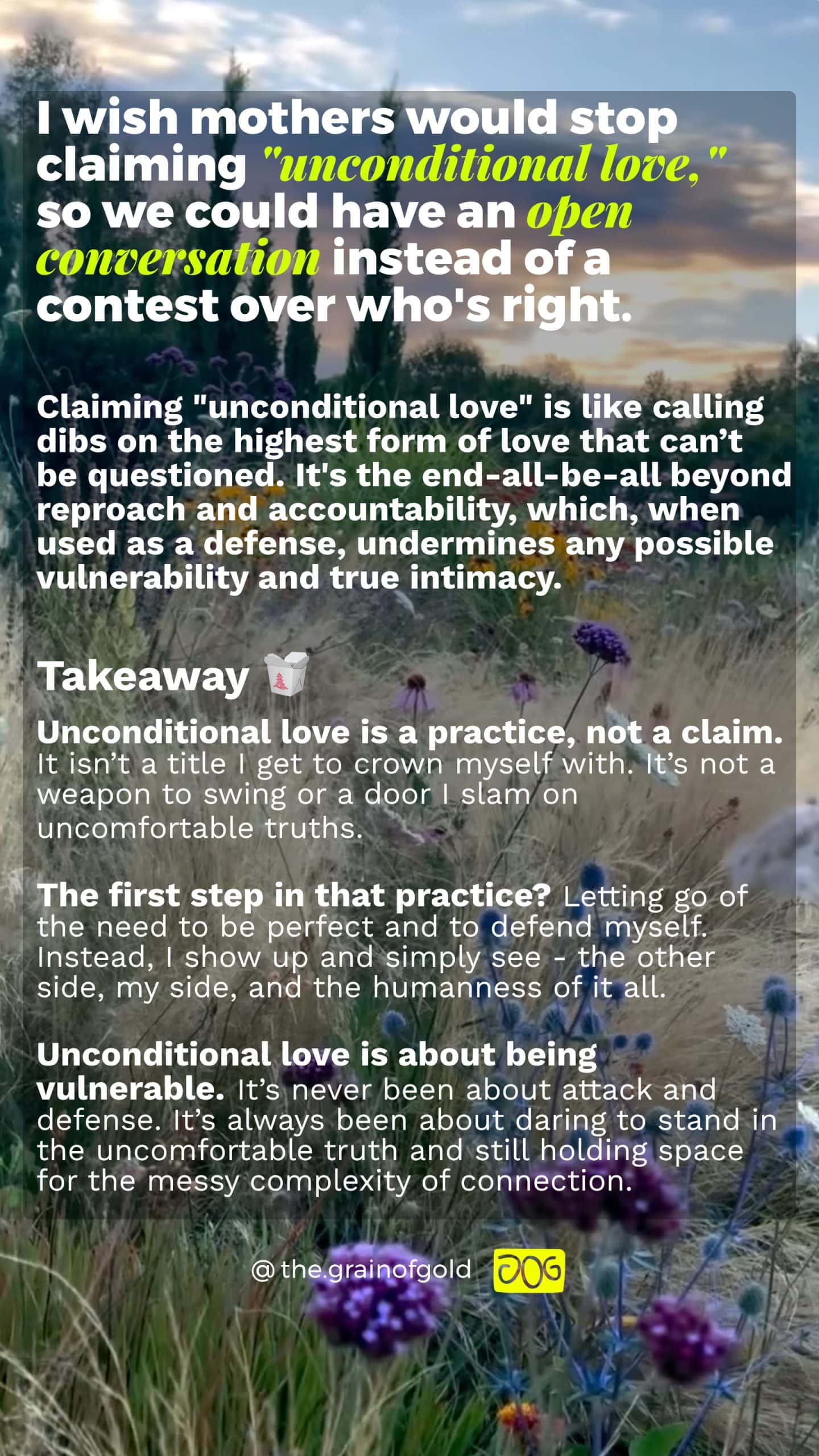
I wish mothers would stop claiming “unconditional love,” so …
“Unconditional love” is a lofty ideal. A girl or woman who has been wounded in childhood – like everyone else has – doesn’t magically become the beacon of unconditional love overnight just because she becomes a mother.
As a human being, I can only aspire to unconditional love. I cannot claim it.
Any claim to such a lofty ideal often serves as a shield – a way to sanctify myself, render myself untouchable, and declare the argument won before it even begins.
It’s just another form of defensiveness wrapped up in the pose of a perfect, supreme, untouchable saint.
So let’s be real – when I use it, I use it as a weapon. Not because it’s what I aspire to, but because it protects me from being accountable and vulnerable.
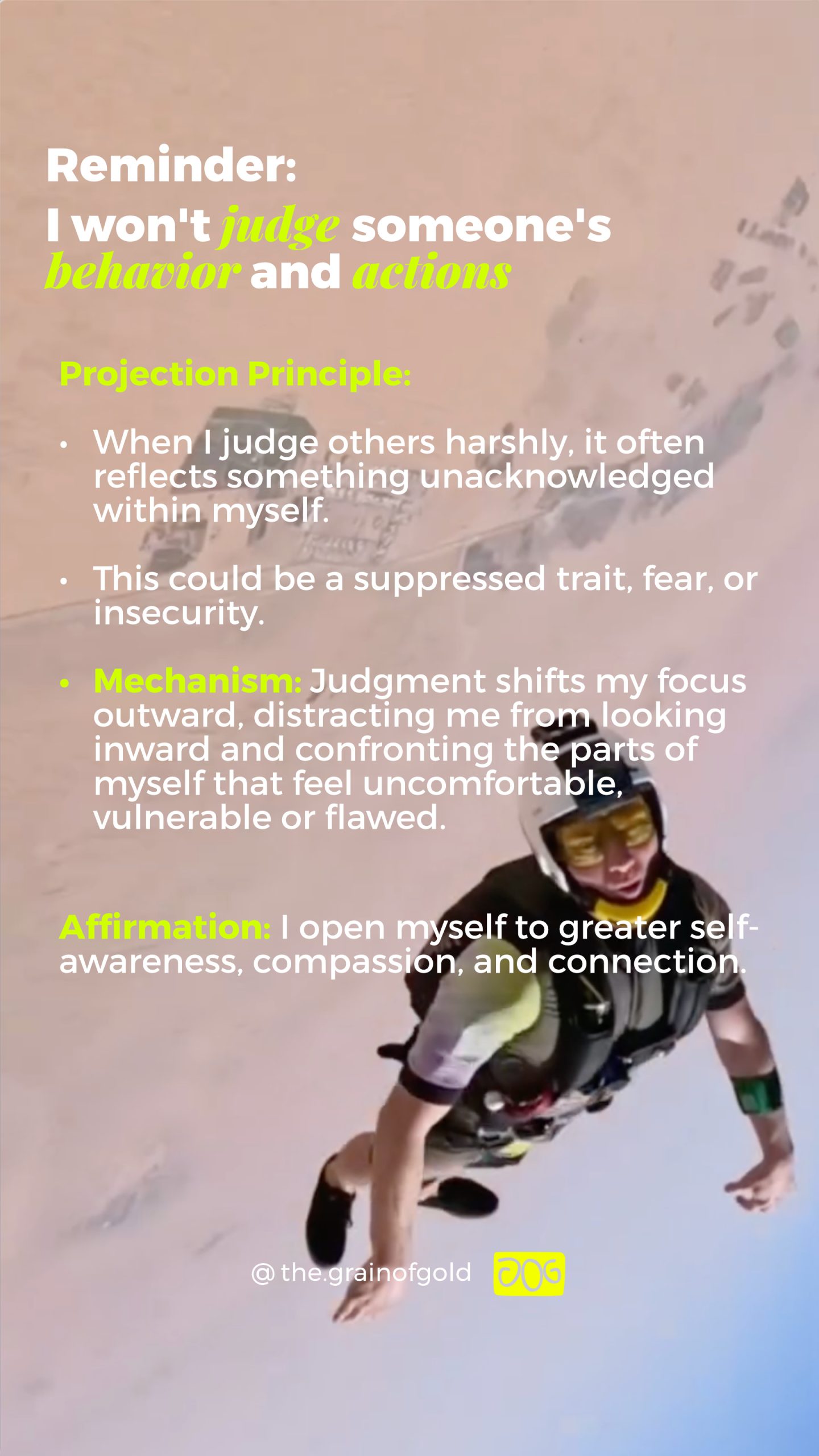
I won’t judge someone’s behavior and actions
How this might look like in life:
For example, judging someone for being “selfish” might reveal my discomfort with asserting my needs.
Criticizing someone for being “too loud” could reflect discomfort with expressing my own voice.
Seeing someone “abandon” a relationship might mirror my own avoidance of setting boundaries or leaving something/someone behind.
Judging someone for being “lazy” could reveal a belief that my worth is tied to productivity, making it hard to feel valuable without constant achievement.
Takeaway 🥡
Judgment is a mirror, reflecting back the parts of myself I resist seeing and don’t permit myself to embody or express.
I stop judging because life has a way of expanding my understanding and breaking down the walls of separation by placing me in situations similar to the ones I judged.
Instead, I open myself to greater self-awareness, compassion, and connection.
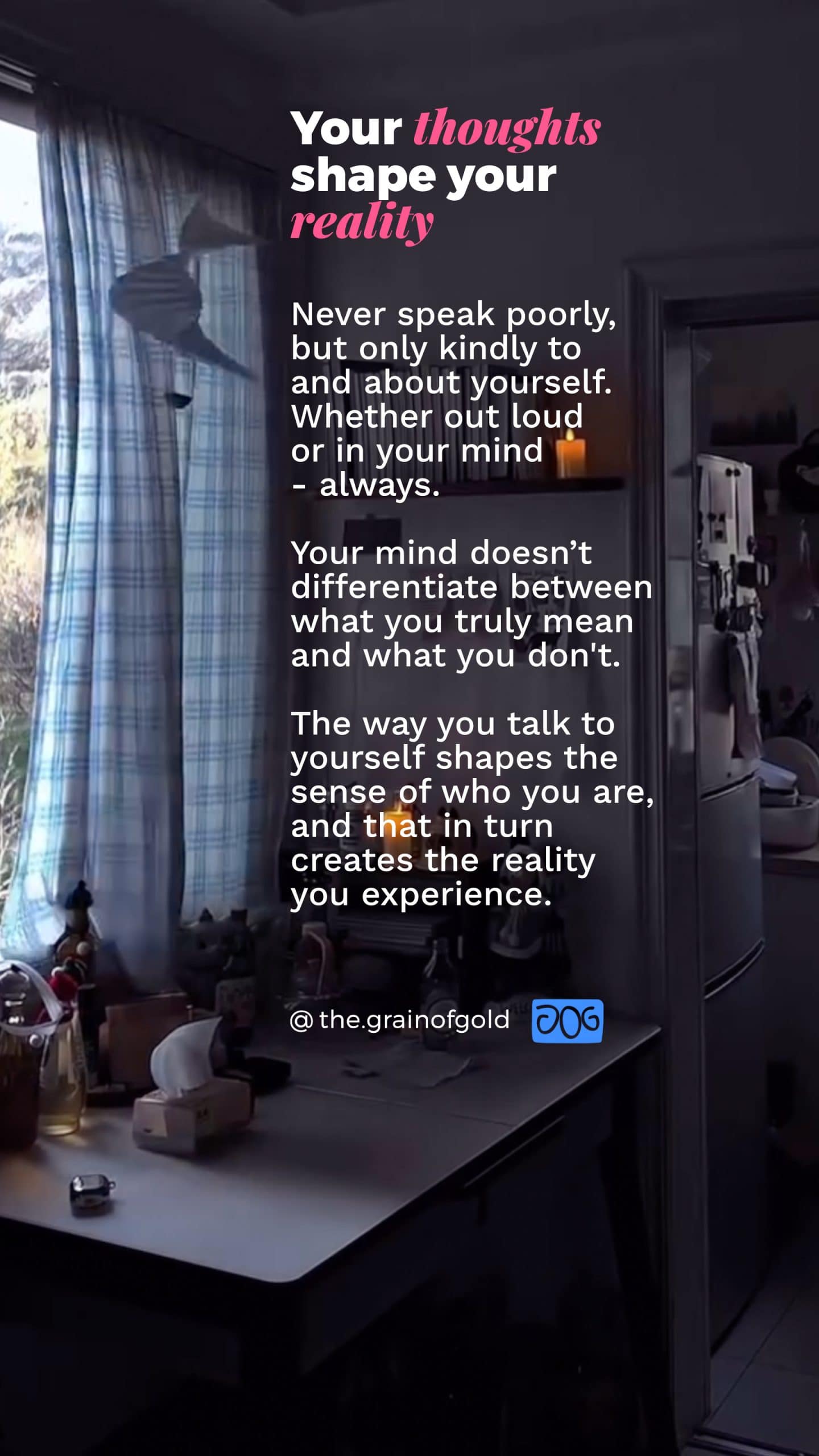
Your thoughts shape your reality
Essentially, how you think directly influences how you move through life, and that in turn shapes what you experience.
So, your thoughts don’t just reflect your reality – they create it. It’s an active process.
You are constantly in a state of creation with your thoughts, emotions, and actions. This is the essence of understanding what inherent power is: recognizing that you’re not a passive observer of your life, but an active creator.
The moment you change your thinking, you begin to change your reality.
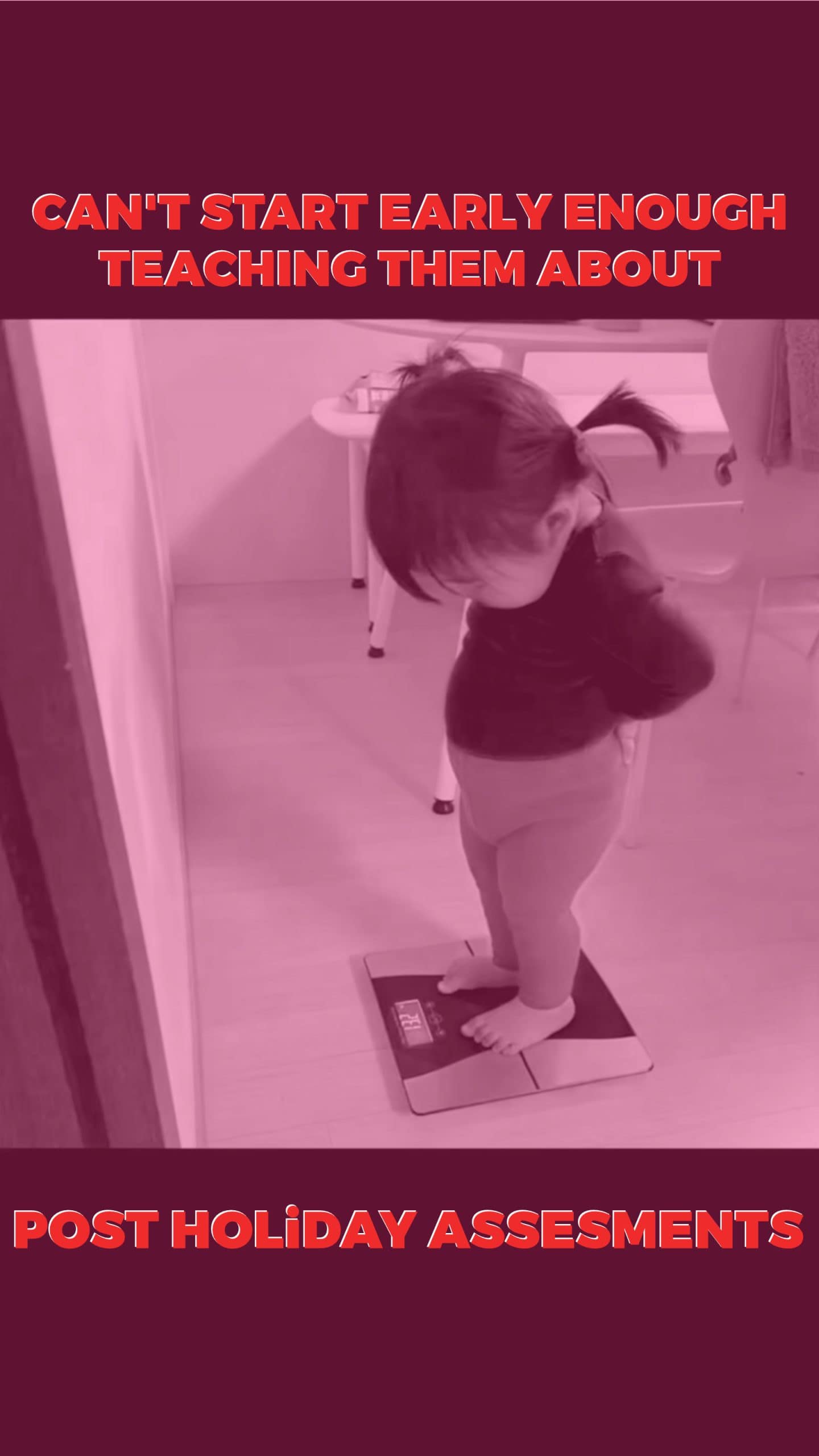
Can’t start early enough with post-holiday assessment
Weight is like the Sword of Damocles, an ever-present threat we can’t seem to escape.
From early on, it’s conditioned into us: your body is you. Whether it’s praise for losing weight, shame for gaining it, or jokes disguised as ‘concern,’ every compliment, insult, or glance reinforces it.
Even as adults, this obsession doesn’t let up. We measure our worth against a number on the scale, fixate on those 5, 10 or 20 “extra” kilos, as if they define our entire existence.
Why have we given weight the power to rule over us like this?
But think about it – our bodies are vehicles, here to carry us through life.
Do we fixate on every scratch or dent in our car with the same emotional intensity? Do we shame or praise ourselves for the car’s appearance? No, we don’t let its imperfections define our worth. A car’s purpose is to get us where we need to go.
So is your body. Does it work? Does it take you where you want to go? Does it help you experience life? That’s what really matters.
It’s not the number. It’s the belief we’ve attached to it.
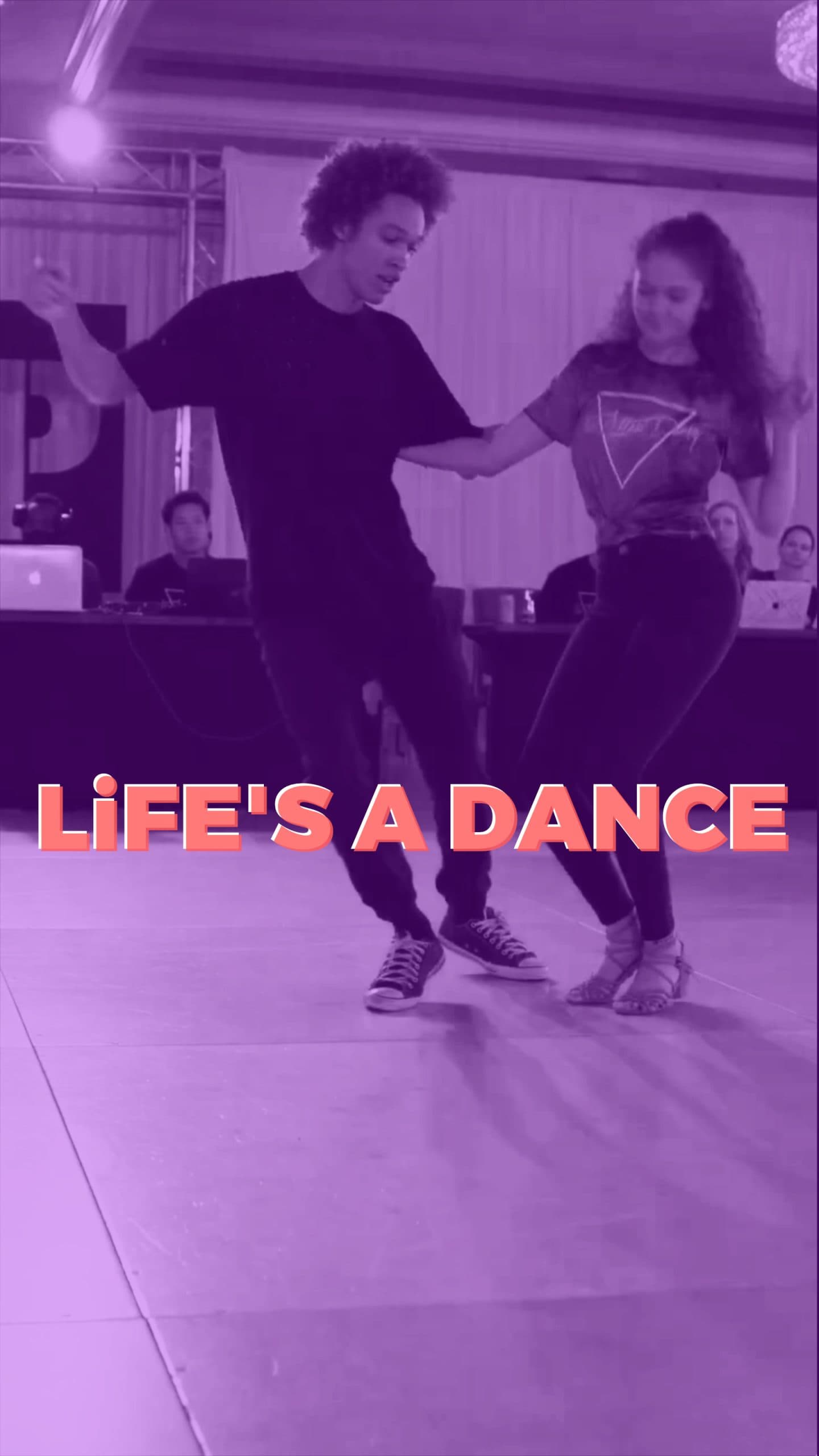
Life is a Dance
We often forget that life is a dance.
The term Līla in Hinduism describes life as a divine, cosmic play, where there is no ultimate purpose or goal, only the unfolding of experience. This idea counters how we in the West approach life, which often focuses on goals, achievements, competition, and the linear progression of time.
Līla reminds us that life doesn’t need to be bound by a “point” to be meaningful. It’s all about pure play – spontaneous and sometimes pointless, even useless.
It’s about being fully present, engaging in improvisation, and letting ourselves be guided by the flow of energy, like our two dancers in the clip (who were randomly paired to dance to a randomly chosen song.)
Why not let this be the vibe for the coming year?!
P.S. If you can’t get into the swing – physically – do it mentally, emotionally, spiritually. We must remember this joy, this freedom to simply be, no matter the stage of life.
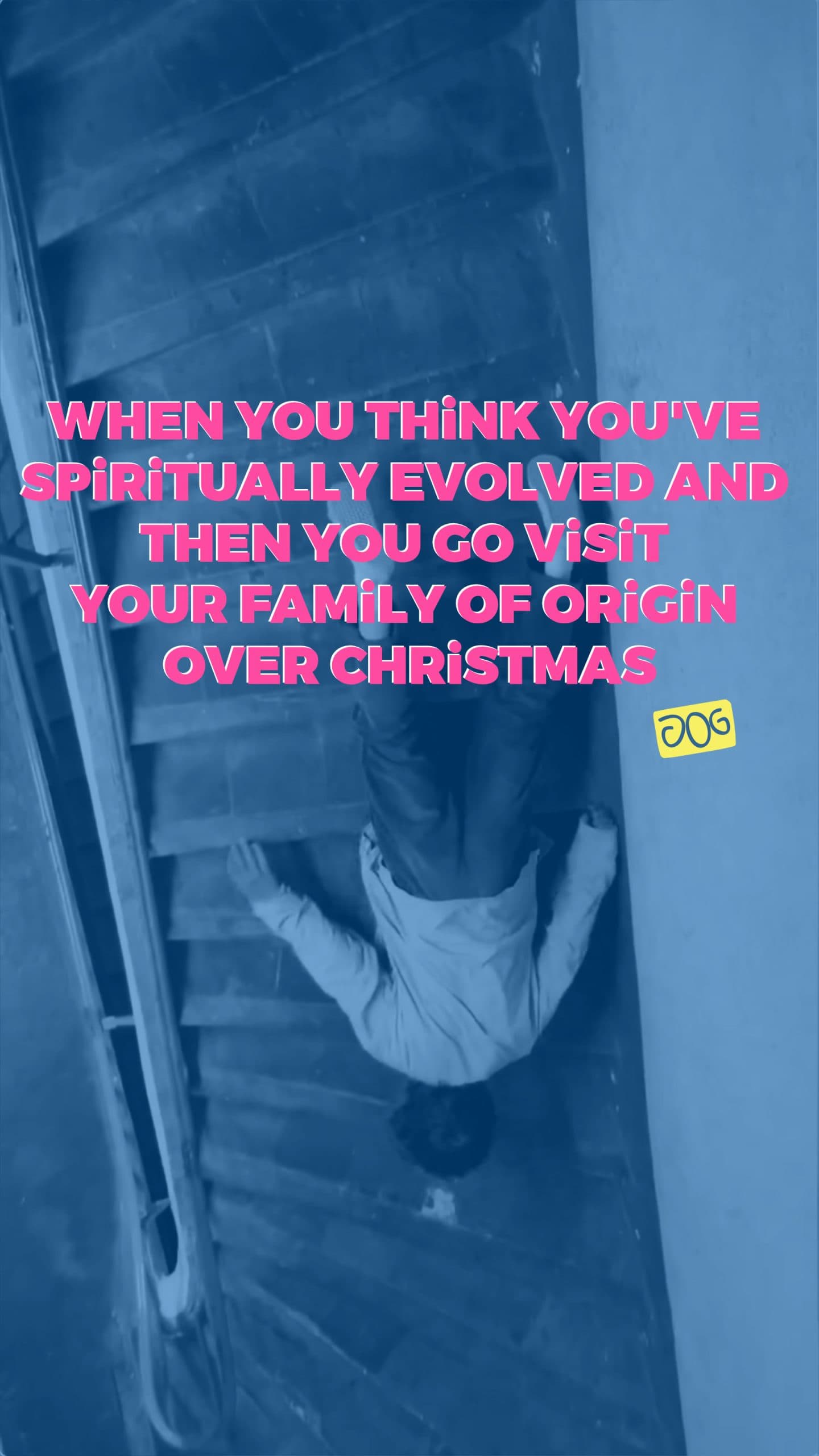
When you think you’ve spiritually evolved and then you go visit your family of origin over Christmas
The family of origin is where your patterns, the roots of your triggers were created, and where your sense of self (or lack thereof) was molded.
No matter how much work you’ve done, going back into that environment feels like stepping into a time machine where preserved old roles and dynamics wait for you.
Your people are like stand-ins for your unhealed wounds, your unmet needs, and the parts of yourself you’ve spent years trying to reconcile. They see you as you were, not as you are. It’s like a mirror reflecting the version of you they remember, not the version you’ve worked so hard to become. And if they haven’t worked on themselves, they will interact with you in the same ways they always have.
It’s not a failure of your work; it only shows how deeply family dynamics are wired into your nervous system. Faltering is part of the process. Each time you show up, setting boundaries, refusing to play the old roles, and seeing your triggers without being consumed, over time, you will stop needing their validation.
Standing in your truth, and knowing you no longer have to play the game, you can walk away intact—or altogether. The dynamics may never change, but your relationship to them can.

You cannot save your children from the mess of this world by betraying them!
Dear future incarnation,
If you ever have kids, don’t make them believe the Santa Claus lie.
That’s not the kind of magic they’re truly looking for. When they eventually find out, it won’t feel like a harmless tradition or a prank – it will feel like a deep betrayal you’ve committed for years. That’s how I felt. And trust me, that hurt far more than any fleeting sense of wonder my parents thought they gave me.
Bro, children live in wonder and magic every single day. To them, a simple cardboard box can become a car, a ship, a shop, or even a castle. They see endless possibilities where adults see limitations. They don’t need the Santa Claus lie to believe in miracles – they already do.
Children don’t need a fabricated figure to teach them about wonder. What they need is an adult who remembers how to see the world with purity and openness.
So, instead of selling them a lie, show up – honestly and directly. Be the example of what it looks like to believe, to imagine, to embrace what can only be seen with the heart.
Children don’t need the polished myth of Santa. They need the real, imperfect you—flesh and blood, but trustworthy.
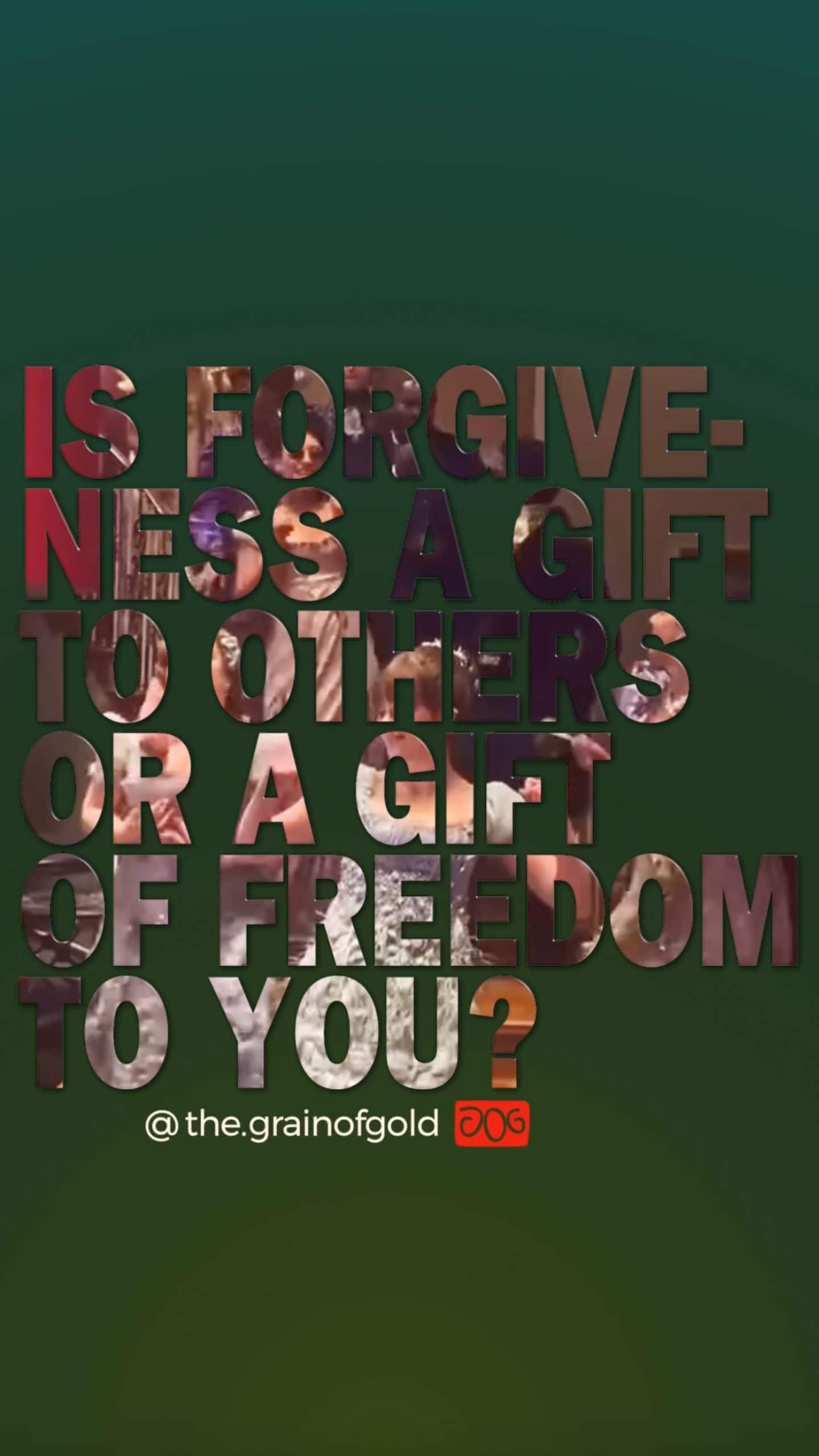
Is forgiveness a gift to others or a gift of freedom to you?
Dear future incarnation,
Forgiveness isn’t a favor to them. It’s an act of self-love and self-liberation.
So you can dance and enjoy life, again.
You might think that forgiveness is about condoning harm, excusing an inexcusable act, or pretending it didn’t happen. Or perhaps you see it as letting someone off the hook, releasing them from a justified punishment.
Deep down you already know: Punishment cannot undo the past. It doesn’t erase what happened or bring back what was lost. You might feel satisfaction when someone is punished for their wrongdoing—but it won’t last long and never, never heal the wound or return things to how they once were.
The truth is, revenge and retaliation keeps you chained to the pain. You feed it instead of free yourself from it.
Forgiveness is not about erasing accountability. It’s about breaking the cycle of pain that ties you to the hurt. It’s not a denial of what happened but a refusal to let hatred, anger or resentment define you.
True forgiveness is about choosing yourself. About choosing to reclaim your power, peace and joy over revenge and bitterness. About taking care of yourself, without relying on the people who have hurt you.
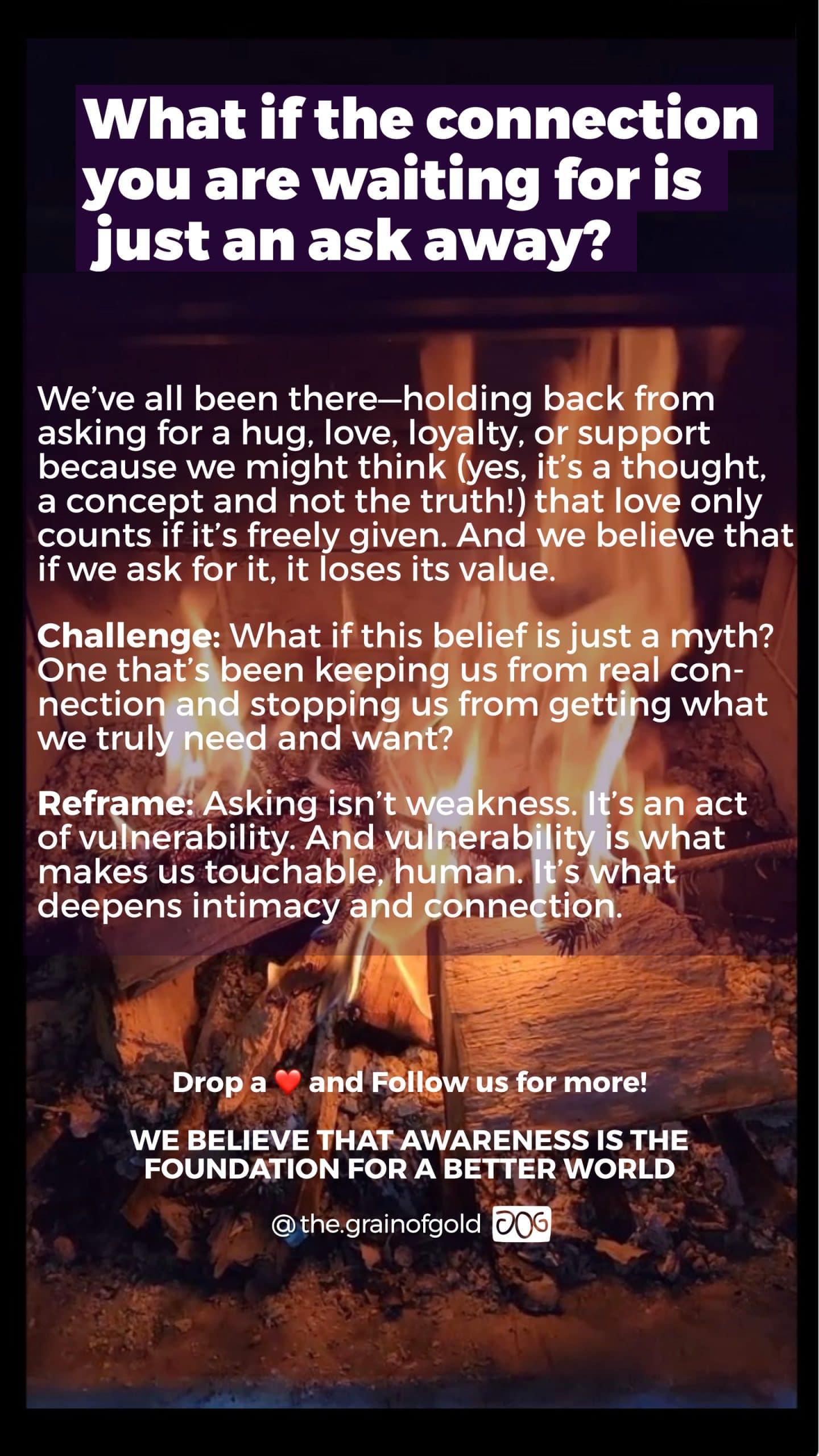
What if the connection you’re waiting for is just an ask away?
The thing is: A hug or support doesn’t feel any less real if you asked for it than if it was given freely.
We’ve been taught this idea that love is only genuine if it’s offered unasked. But that’s a myth. Let’s be real: for many of us, childhood taught us that showing our needs could backfire—get used against us, leave us rejected, or make us feel stupid if the answer was “no.” That fear is what truly holds us back.
But here’s the truth about vulnerability: it’s not about manipulating or guilting someone into giving. It’s about being honest with yourself—what you feel, what you want—and asking without shame, pride, or fear. Just say it. You might actually get it.
And with Christmas coming up, it’s easy to panic if you don’t have plans or fear being alone. If you’re fine spending it alone, great. But if you’re not, dig deep, find your courage, and ask someone. There’s strength in being vulnerable.
.
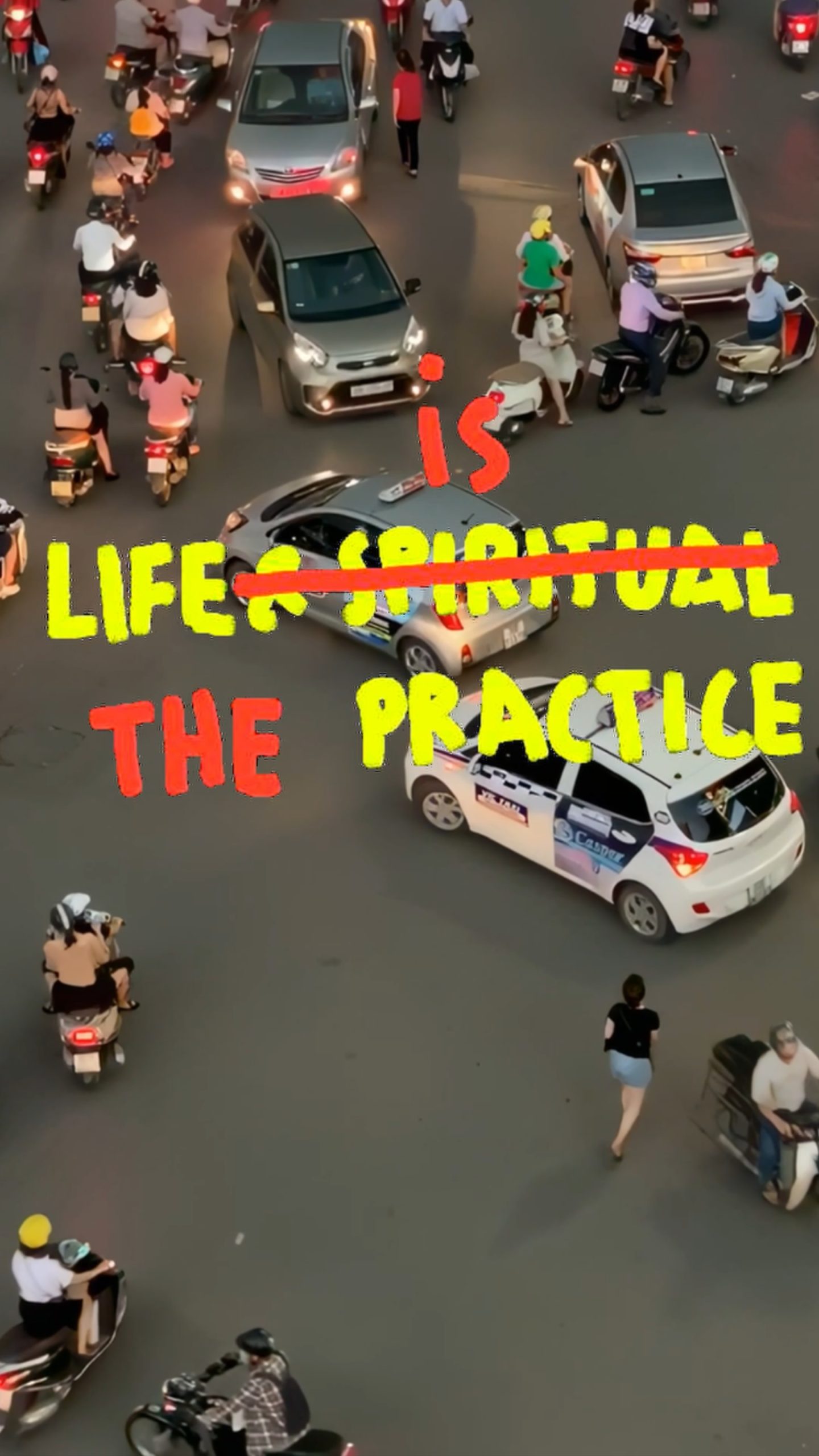
Life is the practice
Life isn’t about splitting time between being “spiritual” and “worldly.” Every moment is the practice. The sacred isn’t hiding in a monastery, a retreat, or a spiritual text. It’s here, in the messy, chaotic, utterly mundane business of being human called life.
Life is the practice.
Why self-realization need self-healing (and vice versa)
Of course, we are spiritual beings. But as long as we are incarnated in a human body in the Earth realm, we need to embrace the human side of our being. Ignoring this would be spiritual bypassing.
On the other hand, if we forget that we are spiritual beings and see ourselves only as human beings, we’ll get stuck in our brokenness and try to control life from that limited view.
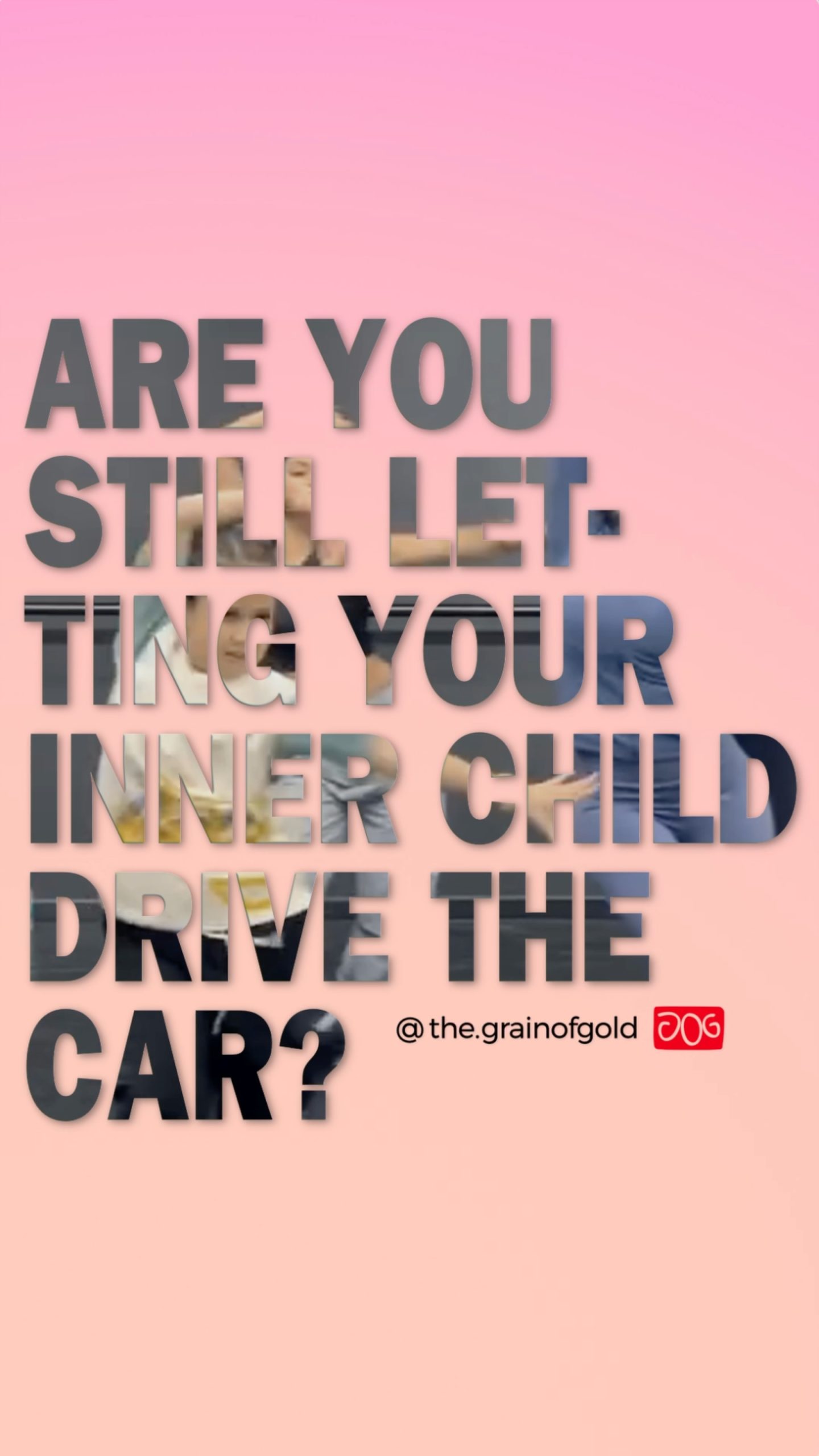
Are you still letting your inner child drive the car?
When our childhood needs aren’t met, the hurt doesn’t just disappear as we grow up. Instead, it festers and bleeds into our adult lives. Without us even realizing it, our inner child often takes the wheel—steering control of our actions, thoughts, and emotions. Not because we can’t but more likely because the unresolved childhood issues drive your behavior.
For example, we may cling to external validation, endlessly chasing approval, because, as a child, we never felt seen or acknowledged. Or we may be overcontrolling to compensate for a lack of structure in childhood. Or perhaps we reject any kind of authority, structure, or societal norms as a way to reclaim autonomy.
Unresolved issues have a way to make themselves known. And when no one takes responsibility for them, we end up with a world where every inner child, with all their unmet needs, is running the show. This is the world we live in today. A chaotic mess of unconscious behavior, driven by pain.
However, our inner child isn’t the enemy here. They are scared, hurt and trying to protect us the only way they know how. They just shouldn’t be in charge. They need us to be the one at the wheel, calm and steady, giving them the reassurance they crave.
dance video credit: @norafatehi
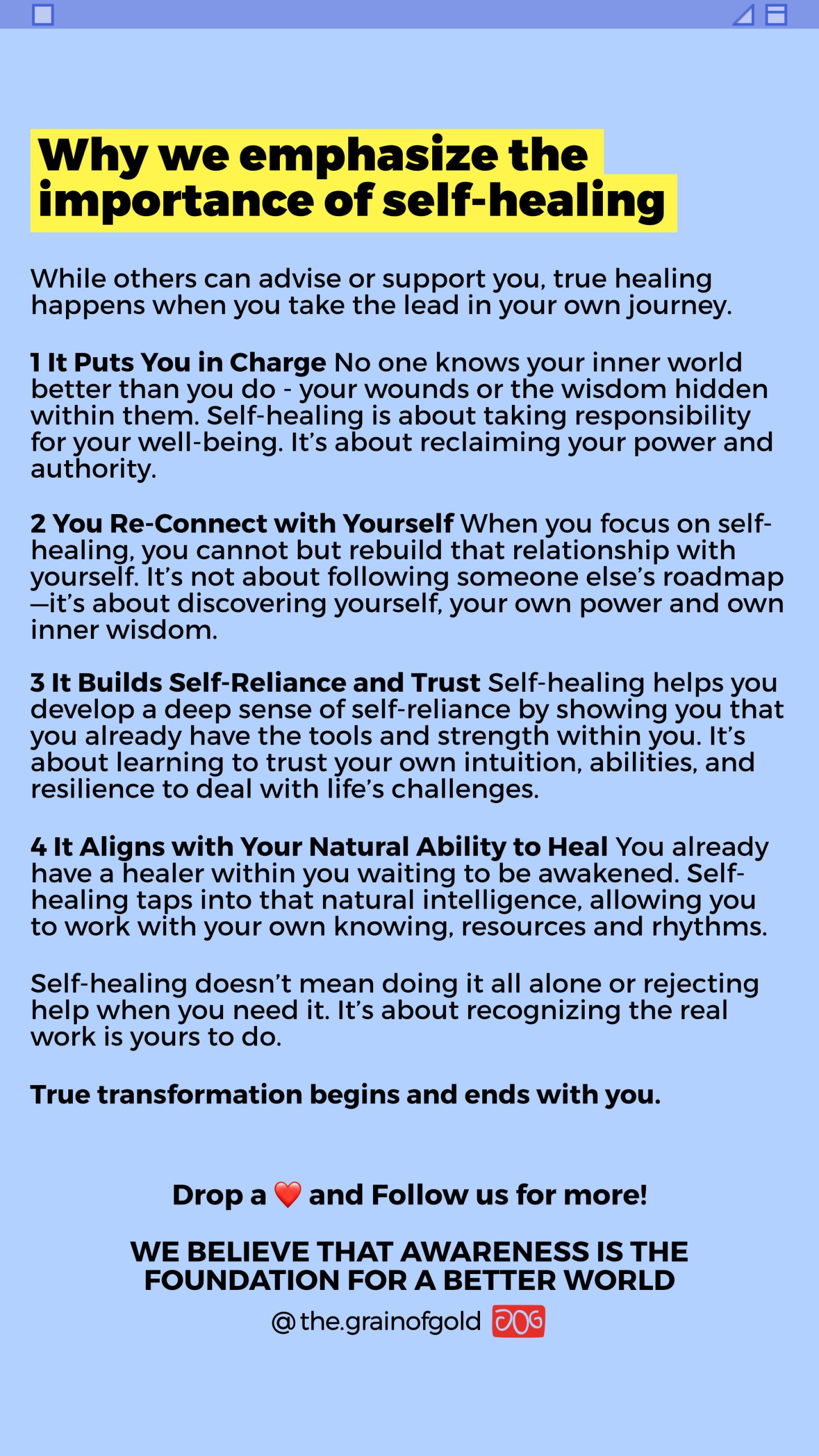
Why we emphasize the importance of self-healing
Healing is self-healing—most of the time, anyway. And when you rely solely on external support, you miss the point. Because here’s the truth no one profits from telling you: YOU ARE YOUR OWN GREATEST HEALER.
So, seek help when you need it. But don’t forget: healing is a path you walk. Not something someone hands to you.
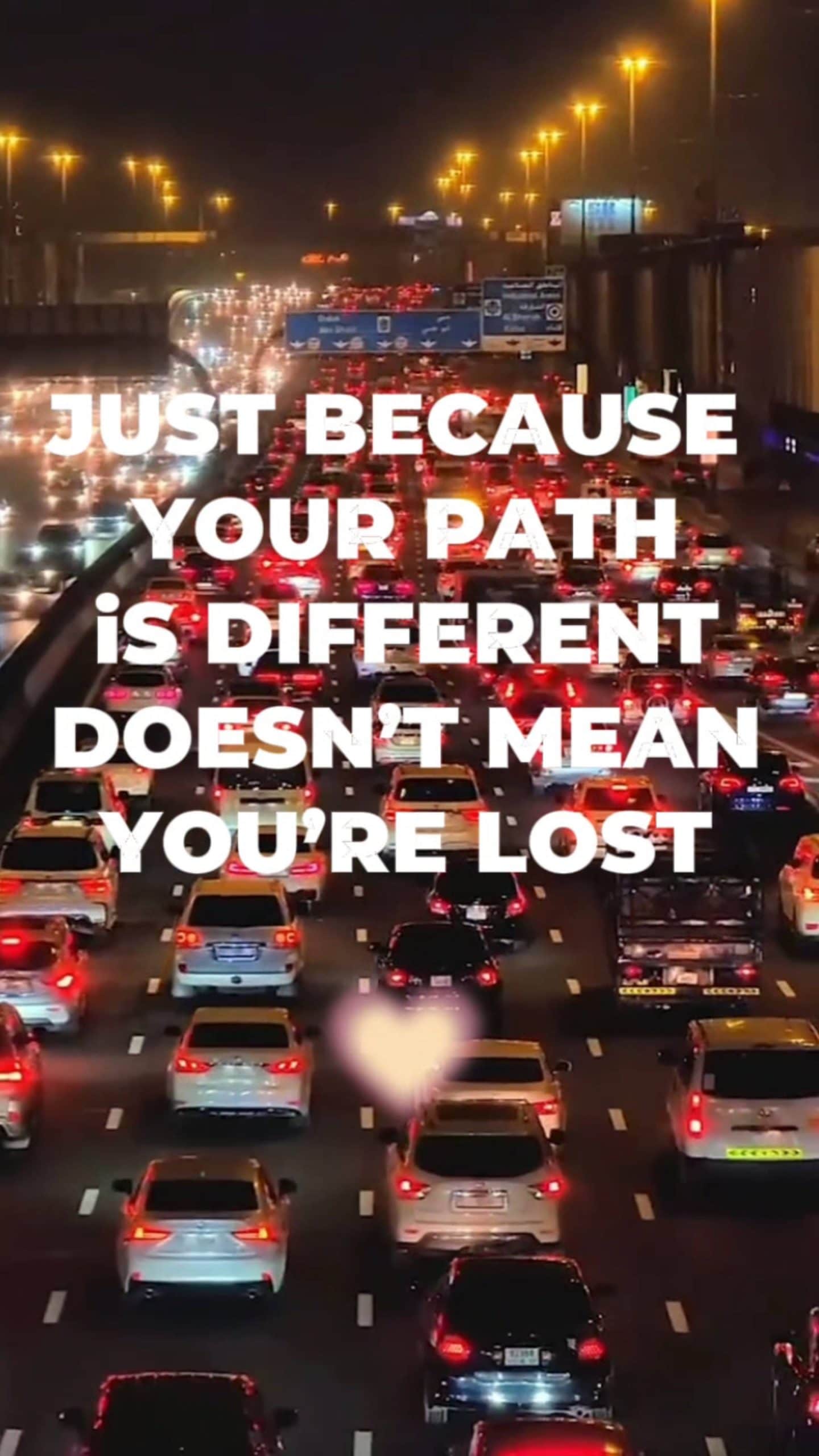
Just because your path is different doesn’t mean you’re lost
The road most traveled might seem easier—less lonely, less demanding, less uncertain, and quicker to get through. But what if its very popularity makes it congested, slowing you down after all?
On the self-carved path, we may look lost, going through chaos and confusion. But: clarity doesn’t come ready-made. It emerges from the very mess—created by pulling out all the buried (and often uncomfortable) stuff, bringing it into the light, and working through it piece by piece.
It’s not easy, but every step we take is ours alone, walking where most wouldn’t dare to go.
Video credit: @dtownmoto
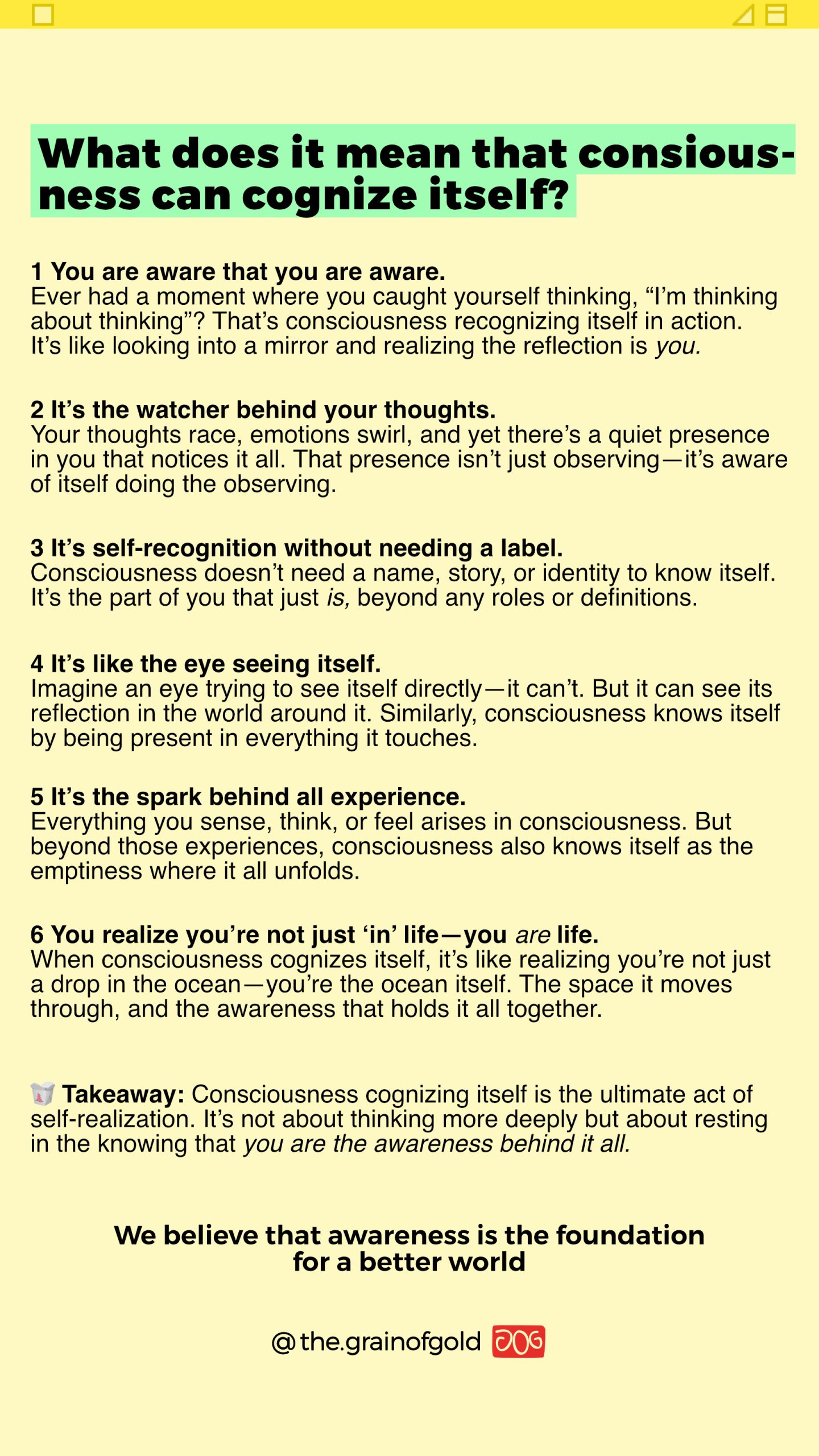
What does it mean tat consciousness can cognize itself?
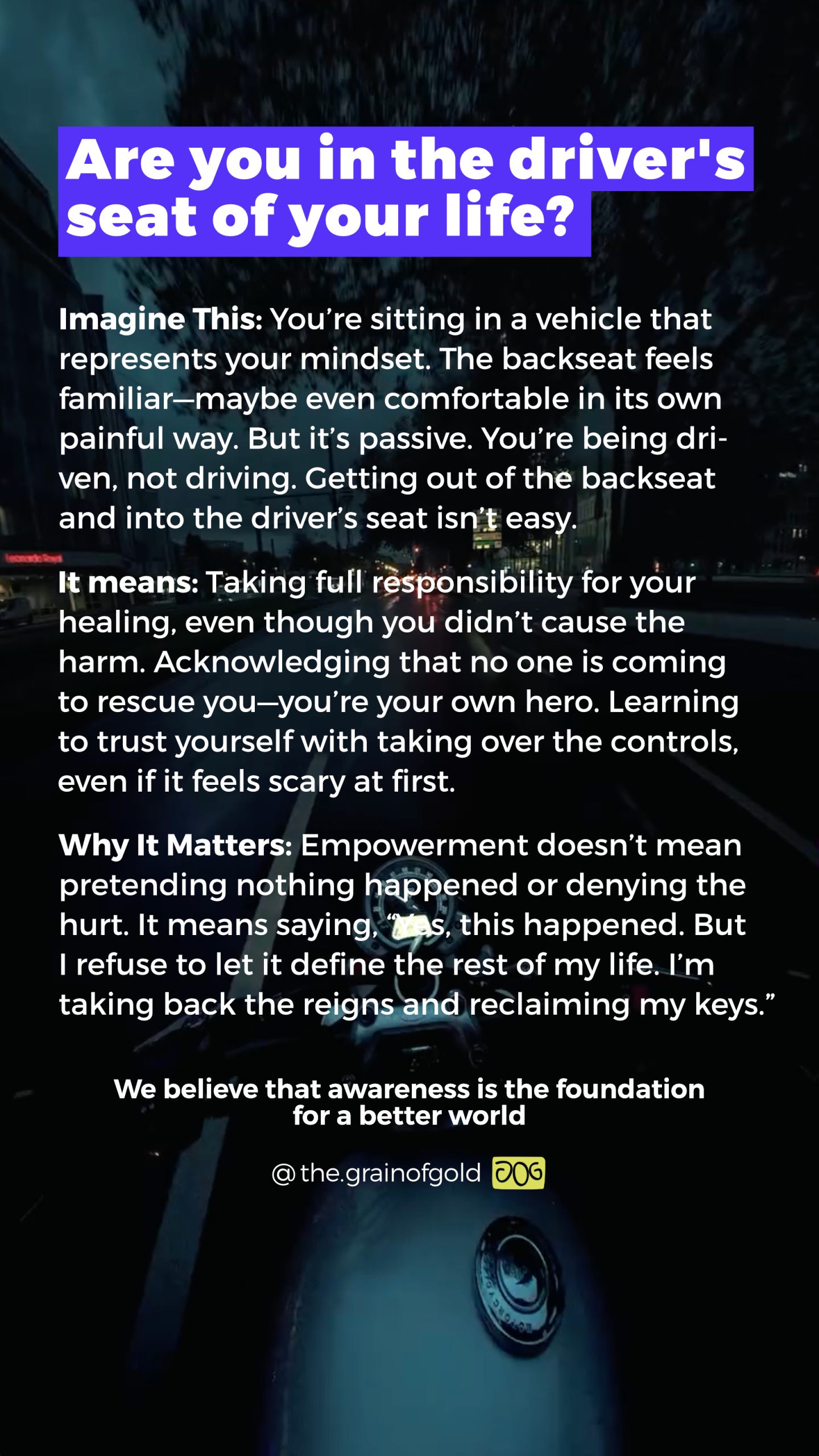
Are you in the driver’s seat of your life?
Trauma, especially in childhood, leaves a mark. It shapes how we see the world, others, and ourselves. And yes, it’s healthy to talk about it, to process, and to feel the pain.
But here’s the hard truth:
If we stay in the mindset of “this was done to me” and keep venting or replaying the story without moving forward, we’re stuck in the backseat of our own lives. And in the backseat, someone else is always in control.
When we adopt a victim mindset, we’re essentially saying, “The person who hurt me still holds the keys to my life.”
But here’s the thing: You didn’t deserve to be put in the backseat. But staying there? That’s a choice.
So, where are you sitting right now? And are you ready to drive?
Video credit: @dtownmoto
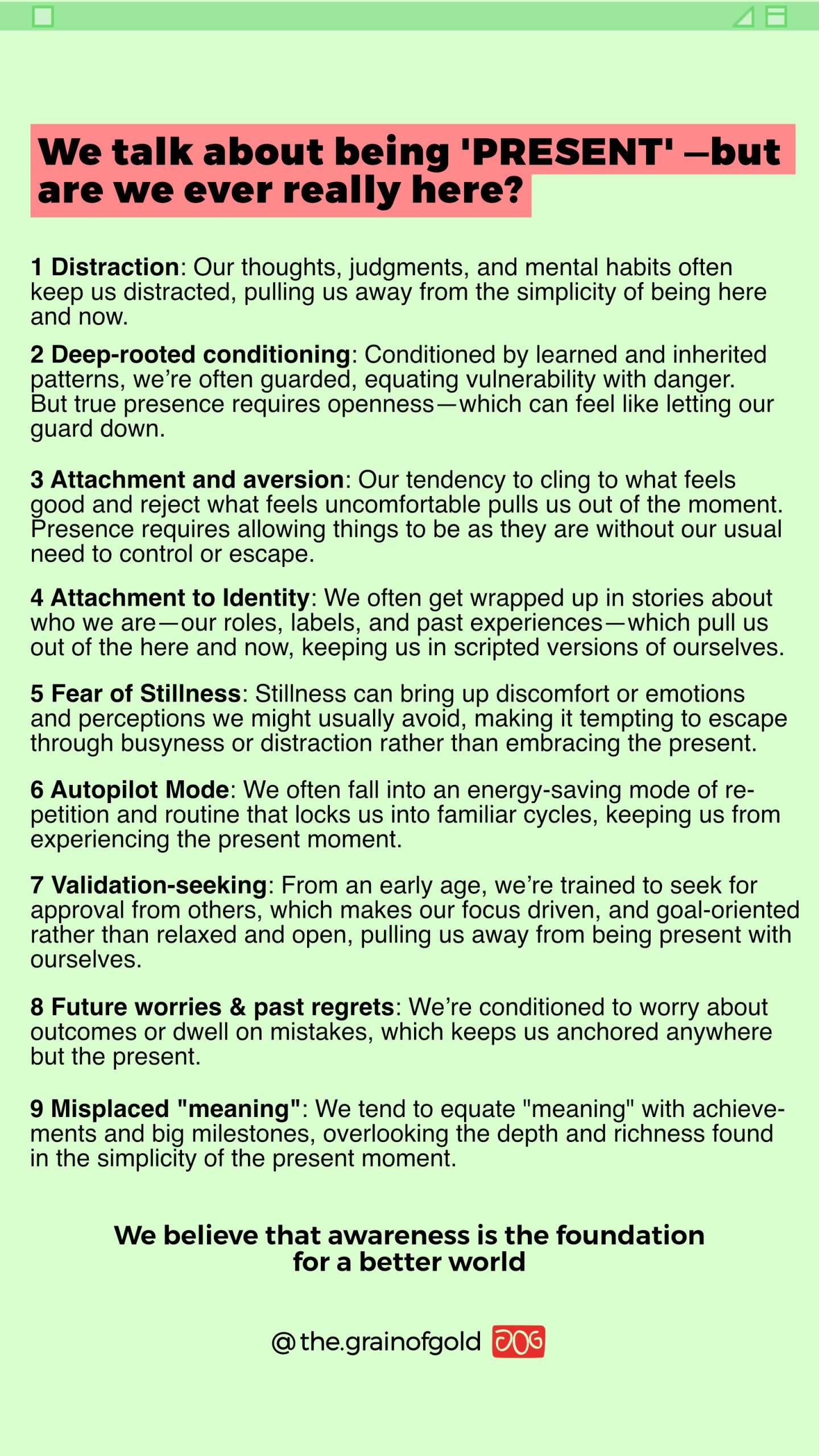
We talk about being ‘present’-but are we ever really here?
Being present feels unnatural because we’ve been conditioned to live in our minds—seeking validation, worrying about the future, and rehashing the past. Distractions and habitual thinking keep us anywhere but here. Truly being present requires unlearning this conditioning, letting go of mental habits, and embracing stillness, which can feel uncomfortable or unfamiliar.
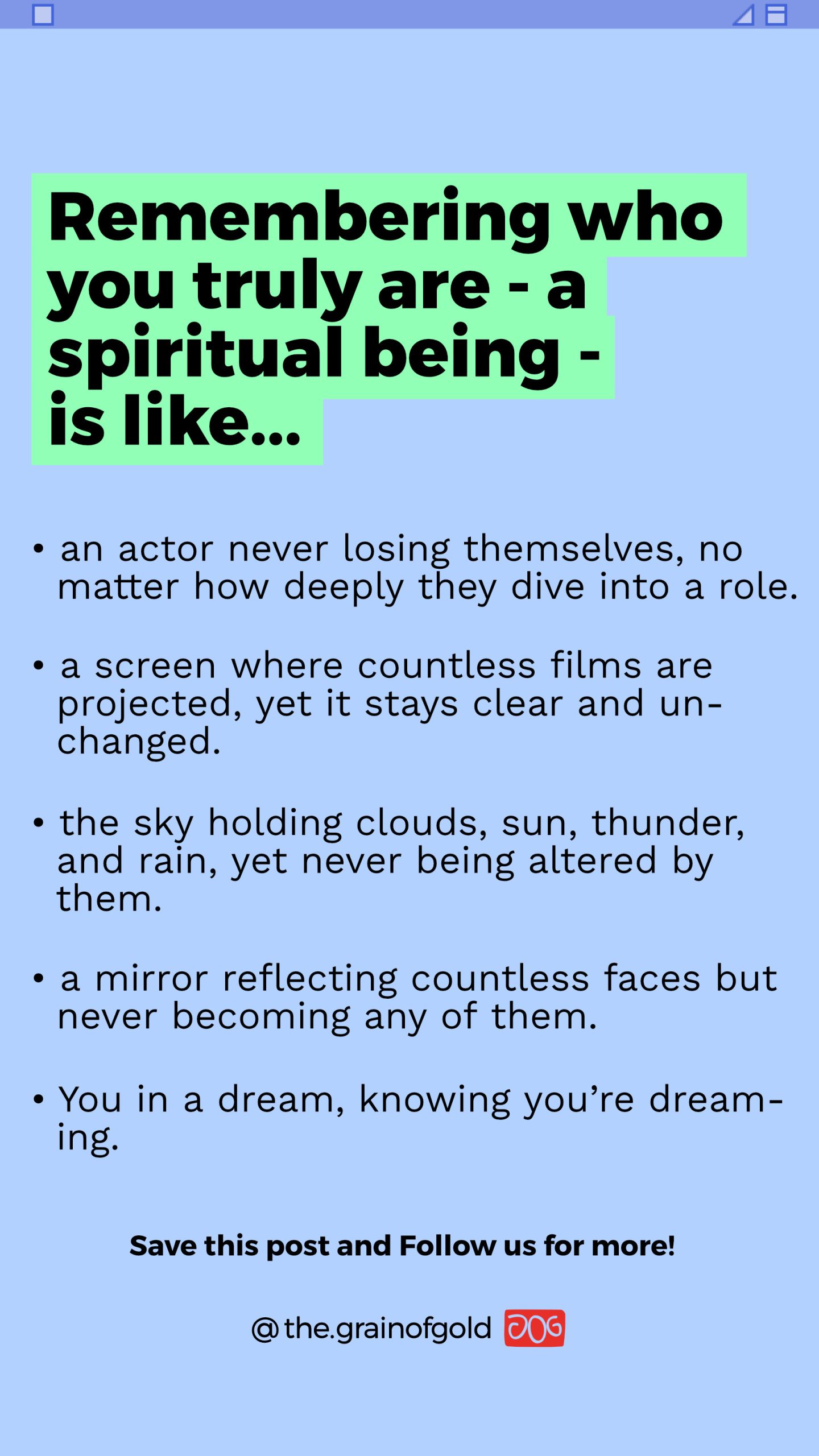
Remembering who You truly are is like…
Remembering who we are at a spiritual level is like Meryl Streep remembering she’s Meryl Streep no matter how deep she dives into her roles. She might inhabit the character fully—feeling every joy, heartbreak, and intensity of their world—but underneath it all, she’s never actually lost in it. She’s aware, with every move, that she is simply playing a part.
Similarly, our journey as spiritual beings in human form can feel as consuming as a role. We get wrapped up in identities, roles, and emotions, sometimes so convincingly that we forget they’re just parts we’re temporarily playing. Remembering our essence—our consciousness—is like Meryl Streep
coming off set, shrugging off the role, and returning to herself.
We can go through life deeply involved, facing suffering and joy, but if we can remember, even for a moment, that we are simply consciousness experiencing these roles, it adds a powerful layer of freedom and resilience.
And like Meryl Streep’s range, we’re free to experience a thousand identities and stories, knowing we’re not confined to any single one.
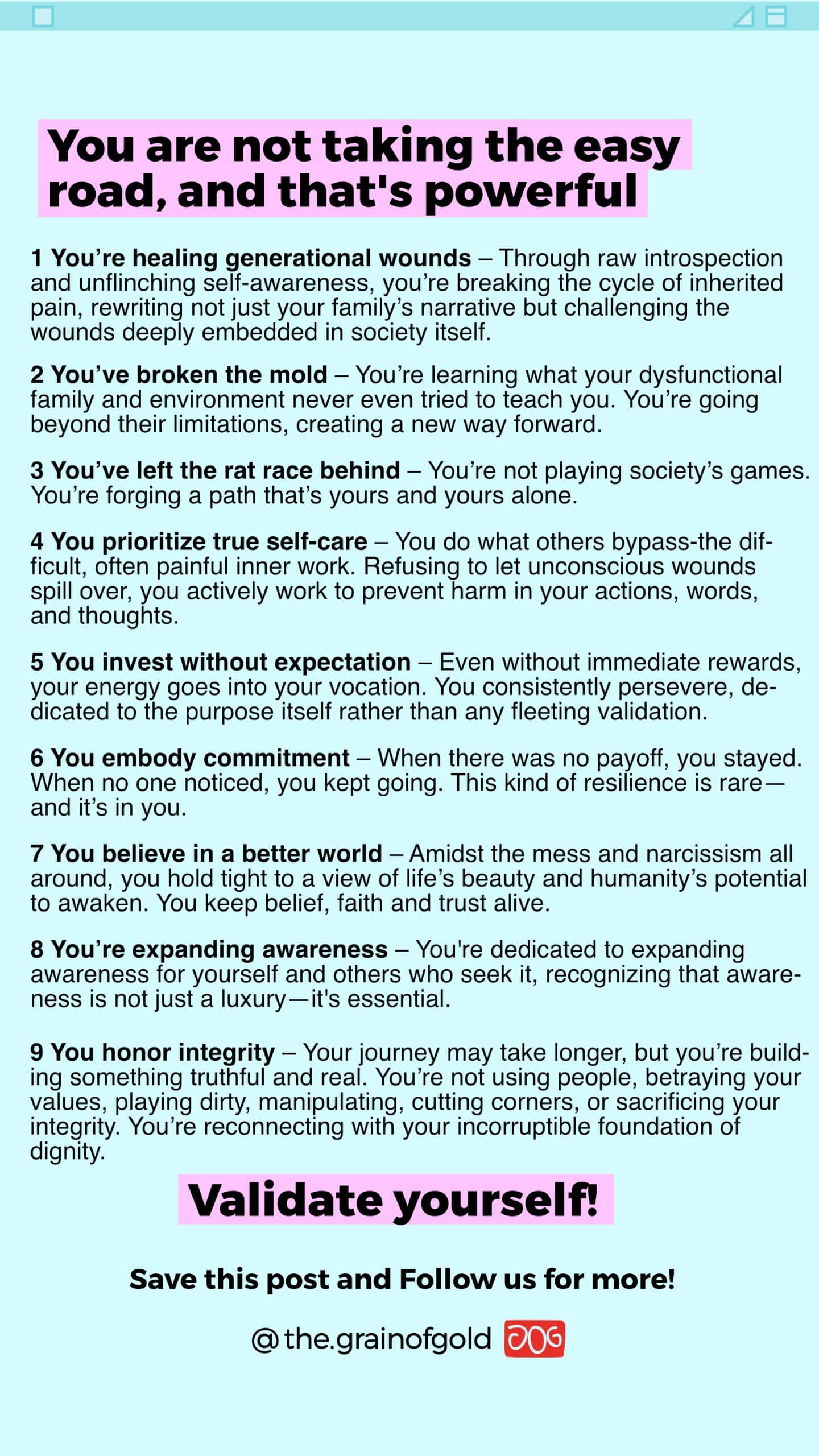
Validate Yourself
Self-validation is powerful. You are enough—and so is your validation. If you don’t recognize your worth, no one else will. Start by acknowledging yourself, because that inner recognition changes everything.
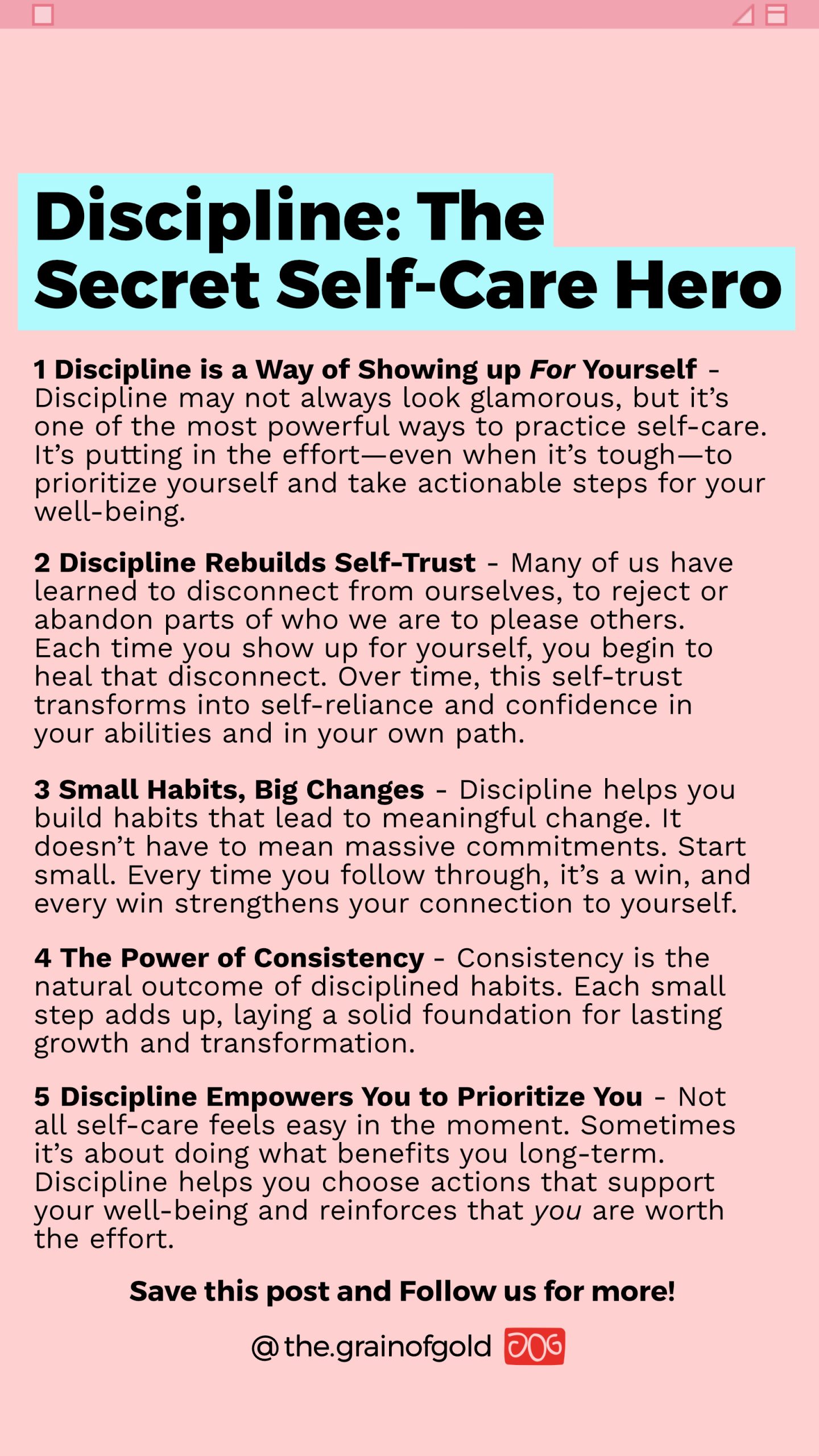
Discipline is actual self-care
Discipline doesn’t get a lot of love. It sounds like strict rules or endless routines, and it might even seem like the opposite of self-care. But it’s the practice that helps you rebuild self-trust. By showing up for yourself—even in small ways—you strengthen your foundation, reconnect with your needs, and invest in lasting growth – one consistent action at a time.
Discipline is like the quiet friend you didn’t know you needed, but who keeps showing up to remind you you’re worth it.
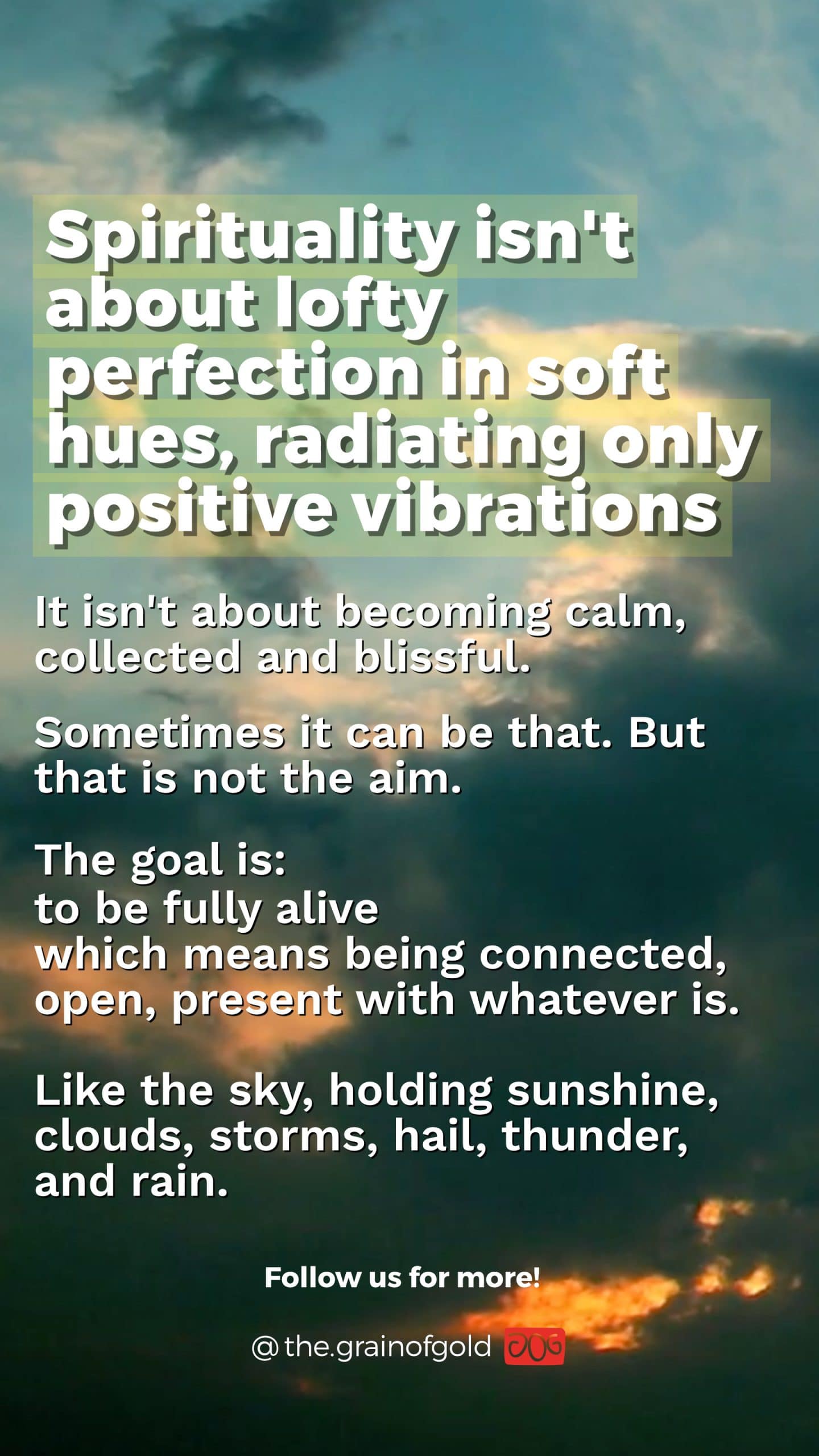
True Spirituality isn’t Calm Contained Perfection
Life is about presence, openness, connectedness and true aliveness. When we treat spirituality as just another asset to control and manage, we’re missing the point. It’s understandable that we crave peace, calm, high vibes, positive experiences, and a bright outlook on life and our future. But if we keep a lid on everything that doesn’t fit that box, we’re only limiting ourselves. Including exactly all the good things we desire.
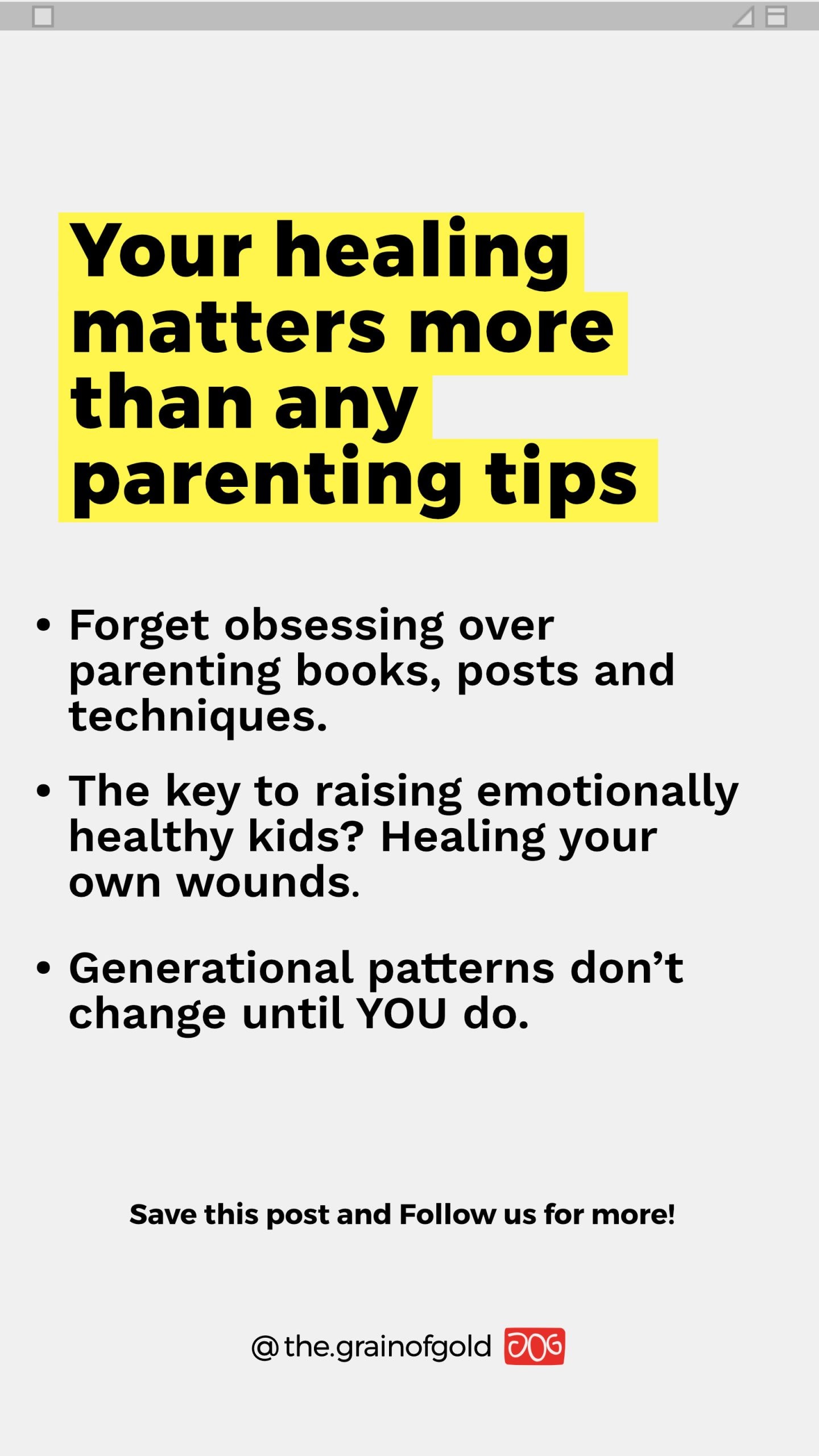
Your Healing matters more than any Parenting Tips
We often think “good” parenting is about focusing on the child—using the right techniques or following the best advice. But the truth is, the focus should be more on the parent. Your healing matters far more than any tip or method.
The patterns you carry, the wounds you haven’t addressed—these will seep into your parenting. If you want your future children to thrive, focus on healing yourself first. When you do the inner work, you break generational cycles and create space for your children to grow into who they truly are, free from the baggage of the past.
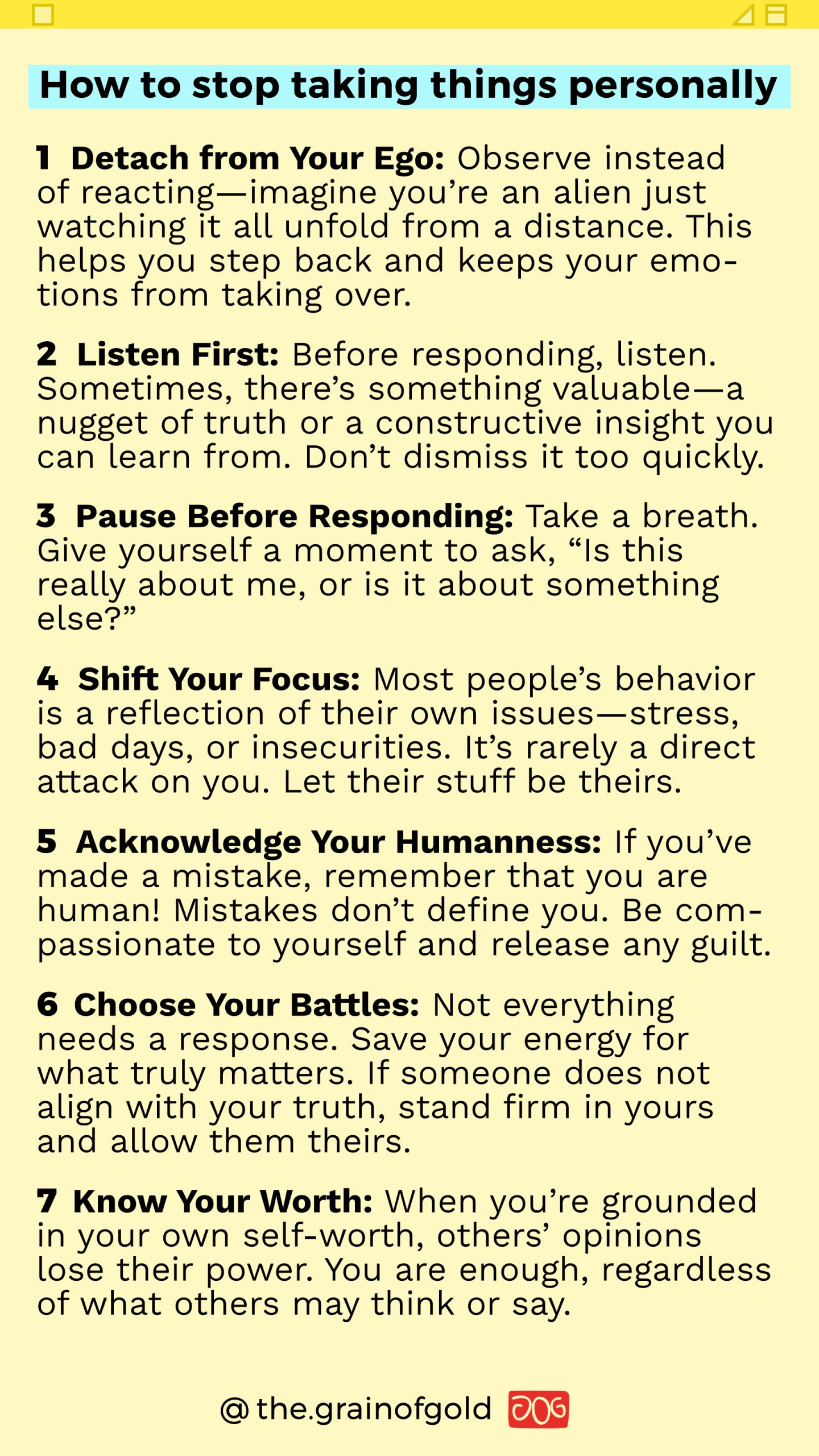
How to stop taking things personally
Often, we fall into the habit of taking things personally. And we all have moments where someone’s words or actions hit us right in the feels. But here’s a truth bomb: most of the time, it’s not about you.
Next time someone’s words sting, try detaching and observing first. There might be something useful in it, or it might just be a reflection of them. Either way, it’s about keeping your ground, preserving your energy and not letting every little thing knock you off balance.

